#well... apparently Tony Curtis saw it too
Explore tagged Tumblr posts
Text
One of my aunts and I are, again, doing a 'The Persuaders!' marathon and I ask you...
How come this hasn't turn into a big thing in Tumblr?
Look... I'm not usually a fan of shipping male leads but this show just lends itself to it... and (at least in the Spanish Dub) Tony Curtis' character makes jokes about it and for what I just saw on a Youtube short, he'd made jokes like that on set too!
C'mon tumblerinas do your magic!
In case that you need to know what this is about:
Lord Brett Sinclair (Roger Moore) and Danny Wilde (Tony Curtis) are two playboys that are recruited by a retired Judge to help him solve cases that he couldn't solve in the past.
It is never really explained why these two would be "dynamite!" as Judge Fulton says but Wilde has street smarts (kind of a juvenile criminal turned into oil-millonaire), Sinclair has... I guess, contacts and knowledge gained through his title, both of them served their countries and in a more confusing vein sometimes they have money and sometimes they don't (reason why the Judge can pressure them into doing his bidding).
Yes, in pretty much all of the episodes the main reason why they get involved is a girl (two if they are lucky) but sometimes they do end empty handed.
After a rocky start they develop a wonderful friendship based on picking on each other but with true love and care for each other's wellbeing. (And Danny calls Brett "my prince" A LOT).
I think that the most Tumbler-catnip episode for shipping is one called Angie...Angie where a Danny's old friend crosses paths with both and ends up being a person of interest. Brett is certain that Angie is guilty but Danny refuses to think so.
Is from 1971, only one season BUT SO WORTH IT. You can watch it here
#tumblerina#do your job#new otp#tumblr fandom#gay#lgbtq#come on I can't be the only one seeing it#well... apparently Tony Curtis saw it too#yes he is Jaime Lee's dad#roger moore#tony curtis#the persuaders
29 notes
·
View notes
Text
Strangers
Part 3 - Grand Illusion (S1E1+S1E2)
Nathan Young x Reader Words: 4k Warnings: Swearing, mentions of sex and nudity, drugs Songs: Too Much On My Mind - The Kinks I Won’t Hurt You - The West Coast Pop Art Experimental Band
“Where are you going, I don't mind I've killed my world and I've killed my time”
Part 1 | Part 2 | Part 3 | Masterlist | Ao3
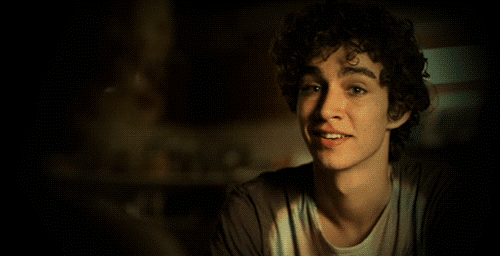
--
You’re just about done changing, closing your locker and stepping away to zip up the front of your jumpsuit and fix your hair. It’s just you, Nathan, Curtis, and Simon remaining when Nathan whistles and motions for everyone to huddle up. “So…” he begins seriously, an emotion one does not typically expect from Nathan. “If anyone asks what happened yesterday, we say nothin’, right? It’s just a completely normal day.” You nod in agreement as he looks at each of you in turn. Having left the locker room, you are now all standing together to await whatever new probation worker was sent to replace Tony after his mysterious disappearance. You try to look as normal as possible, leaning casually against a pillar and definitely not making any sideways glances at your fellow young offenders. It‘s hard to resist the urge.
A woman walks up to stand before you all, she looks to be about in her early thirties and is dressed simply but well. Her hair is dark, long, and some of it is pulled away from her face. She’s pretty, but by all accounts, a remarkably normal person. You assume she’s the new probation worker, and you’re right. “Gary and my colleague Tony have both been reported missing. Their families are very worried about them. Have you seen anything unusual? Anything at all?” Nathan raises his eyebrows and holds up a finger to catch her attention. “You saw something?” she asks. You desperately want to stop this. Nathan has just told you, moments ago, that you should act like nothing happened yesterday, and yet here he is. He probably isn’t going to tell her the truth, you can’t imagine him ratting everyone out like that, but you can’t imagine him saying anything that would make the situation better, either. “A few days ago…” Kelly shakes her head slightly, trying to get him to stop, and you try to catch his eye to send him a harrowing gaze, but he just barrels on. “I go into the toilets, Tony and Gary were in there. They’re butt naked.” You breathe a sigh of relief that luckily sounded remarkably close to exasperation, which is probably because it was. “Tony has Gary by his hair, like this, an�� he’s just doin’ him, doggy style!” He starts to thrust and grunt, and you put a hand to your cheek, half over your mouth to suppress your involuntary grin. What he’s doing was disgusting, but oddly entertaining. It’s like watching a trainwreck. “And Tony is like ‘Aaagh! Who’s your daddy? I’m your daddy, I’m Big Daddy!’” It’s vulgar, honestly. Nathan gets really into it, making crude motions and grunts, chanting, “Oh yeah, oh yeah, ooooh yeah!” before calling out “I’m daddy cool!” Tony would have presumably finished then, because Nathan stops thrusting to put his hands on his hips and return to his normal posture. “So I’m guessing they’ve ran away to continue their illicit homosexual affair. And I ask you, in this world of intolerance and prejudice, who are we, who are we to condemn them?” He’s on point with the social justice, but now is decidedly not the right time, place, or circumstances. The probation worker says nothing and just walks away. You reach out and shove Nathan. “What the everloving fuck was that?” He gasps indignantly. “I was just trying to act normal!” “If that’s your idea of normal, then there’s somethin’ seriously wrong in your head,” Kelly scolds. “I thought we already knew that,” Curtis agrees, earning a giggle from Alisha. You all congregate on the roof, standing together, overlooking the lake and office buildings on its far side. Ah, the charming sights of Wertham, an army of identical fifteen-story grey blocks. Nathan takes a drag from his cigarette before smiling, “Well, I think we got away from it.” “Do you actually believe that, or are you just really dumb?” Curtis asks sarcastically, and you snicker. “I actually believe that!” Nathan insists. You had just laughed at him, but there’s something in Nathan’s earnest voice that makes you want to believe it, too. “I mean I was there, right? I should have one of these bullshit powers.” “You can have mine,’ Kelly gripes. “You want to hear what people are thinkin’ about you?” “Not so much, no. I want something good, you know? Something from the A-list.” “Maybe you can fly,” Simon offers quietly. Nathan’s face lights up. “He’s not going to be able to fly,” Alisha reasons. “Yeah, there’s always someone who can fly, check it out!” His confidence in this proposition seems inordinately inflated. “We don’t need you trying to jump off buildings like superman to test it,” you add, knowing full well that Nathan could and would. “Ah, I won’t!” He walks over to a nearby chair, far away from the roof’s ledge, and climbs up. “This has no chance of working, right?” You lean in to whisper to Kelly. “None,” she agrees. Nathan leaps into the air, raising his arms up hopefully, but he just falls to the ground like a sack of bricks, except with the addition of a nasty smack. “Ow! No, that’s not it,” he groans, picking himself up with a childish expression of annoyance on his face. “So what happens now? Is this it?” Curtis asks, turning to look at everyone. “Are we gonna be like this forever?” “What if we’re meant to be, like, superheroes?” Now, you really do want to include Simon more, he seems like a genuinely nice, if chronically shy, person, but his suggestions today are horribly lacking. “You lot, superheroes?” Nathan asks, sounding more jealous than anything. Kelly looked worryingly contemplative, and you’re bothered by how well the story seems to fit. “No offense, but in what kind of fucked up world would that be allowed to happen?” “This world is pretty fucked up,” you point out. “I did not sign up for that,” Alisha exclaims. “Superheroes!” Nathan continues with the thinly-veiled jealousy. “I love this guy, you prick!” “What if there’s loads of people like us all over town?” Kelly askes, and she has a point. It had been a pretty large storm, you couldn’t be the only people who had seen or experienced it, right? Are there other people going about their normal, daily lives discovering their powers right now? “No,” Nathan scoffs, cigarette smoke billowing from his nose. “That kind of thing only happens in America. This will fade away. I’m telling you, by this time next week, it’ll be back to the same old boring shit.” Needless to say, this would not prove to be at all true. Your task that day is picking up litter, each of you are given a large plastic bag and trash grabber before being set loose on the city, to collect trash with reckless abandon! In reality, you probably won’t even stray far from the community center. As you follow along the edge of the lake, Nathan continues to complain about his lack of a cool new superhero ability. “And what? Because you’re all special and I’m not? Yeah, well I doubt it. You can think what you like, but I have a ‘superpower’” he uses air quotes and says the word in a comically high-pitched valley-girl voice. “I just need to find out what it is.” “Maybe you’re just super retarded!” Alisha proclaims, and a cursory glance at the rest of the group would tell you she isn’t the only one growing annoyed at him. “Maybe I’ve got a whole Spiderman vibe going on, you know?” he continues unabashed. “Maybe I can climb stuff and do spider shit.” “Yeah, cuz that makes perfect sense,” Curtis cuts in. “Why would you be able to climb stuff?” “I don’t know!” Nathan calls back. “How is it that you can turn back time, apparently? And weird kid can turn invisible?” He pokes Simon in the back of the head with his grabber. “It’s not like this whole situation is backed up by a wank-load of logic.” Later in the morning, you’ve moved all the way from right outside the community center to a tunnel under a nearby bridge. It’s a disturbingly gross place, but its inordinate abundance of trash has led you there, calling to be picked up and sent away to landfill. Curtis peers curiously at something he’s picked up with his grabbers, some sort of melted hunk of plastic. But as he peers, he notices something tucked into a corner not that far away. Something that looks fleshy and pink and remarkably human. “What is that?” he asks, voice dripping with disgust. You scrunch up your nose and move in to get a closer look. “Oh, god…” you groan. It’s a human man, completely naked, lying face down on the pavement. You are suitably disgusted. “Is he breathin’?” Kelly asks. Alisha strides forward without much hesitation and pokes his bare ass with her grabber. “Hey, nude guy!” she calls. “You’re naked!” Your eyes widen and everyone, yourself included lets out cries of protest as he rolls over to reveal himself, full-frontal. It’s not a pretty sight. Simon snapps a photo, you’re not exactly sure why, but documentation seems to be his response to everything so far. “Good lord!” Curtis protests, turning away. “Oh my god!” Alisha laughs, finding it funny more than anything else. Kelly actually turns around completely to avoid seeing any more of it. Nathan’s jaw, however, drops. Realization spreads over both of their faces and Nathan points an accusatory finger at the naked man before crying out, “You?!” The man stands up as fast as he can and bolts, but Nathan is outraged. “Hey!” He tries running after the man, but it’s too late. “Do you want to tell us who that was?” Curtis questions through a chorus of laughter. “He’s my mum’s– He lives with my mum.” He eyes everyone defensively. Alisha chuckles before proclaiming matter-of-factly, “Your stepdad has got a massive cock.” You snicker, even though you don’t want to have to think about it much. It was quite a disturbing image, even more so now that you know he’s close to Nathan’s mum. But… it was true. “Jesus!” Nathan cries in objection. “And he’s not my stepdad, alright?” You hold up your arms in mock surrender, “I assure you, I’m completely ready to forget about that picture, it should be purged from my mind.” Alisha leans closer to you and Kelly, guffawing. “Did you see that thing? That was like monster big!” She locks eyes with Nathan and hisses as if in pain, lowering her voice suggestively. “Your mum will hurt.” “La, la, la! Shut up!” He closes his eyes and literally sticks his fingers in his ears to block out her nasty comments. “Why’s he naked?” Kelly asks, turning to Nathan for the answers he doesn’t have. He gapes, trying to piece it all together, but Alisha speaks up before he can be given the chance. “Well he’s obviously some kind of pervert. Or he’s gay.” You wince at the presumptive, nay, offensive comment, not exactly fond of how it perpetuates harmful stereotypes. Curtis scoffs at her remark, “That follows.” “Well, he was cruising for rough trade!” she explains indignantly. “They love that shit!” “Oh, a little light homophobia? Go for it!” You have to agree with Curtis’ sarcastic reply here for a multitude of reasons, one of which being because you highly doubt Natha’s stepdad is secretly gay. “Or he could be a rapist,” Kelly muses with far too much nonchalance. “There’s loads of ‘em ‘round here.” “Maybe he’s a werewolf,” Simon posits seriously. Everyone sort of sneers at the idea and Nathan certainly isn’t pleased, exclaiming, “Twat!” “It’s what happens in films,” Simon tries to elaborate, growing visibly more nervous by the second. “You turn into a werewolf, you kill someone, an’ then you wake up somewhere naked… Like a zoo.” “He’s not a werewolf, alright?” Nathan protests hotly, defensiveness creeping into the edges of his voice. With the recent storm and all these odd powers, it’s all too likely that Simon’s right, or at the very least eerily close. “This guy is such a pussy, he needs my mum to open jars for him. I’m sure if he was a werewolf, he’d be able to open a jar of peanut butter for himself!” “What happens if the storm messed him up?” Kelly interjects. “Yeah,” you add, agreeing with her not only because it does make some sense, but also because you really want to bother Nathan, “he’s probably only been a werewolf for two days.” “What do you mean probably?” Nathan proclaims. His growing look of disbelief is incredibly amusing. “Well, Alisha had a point…” You look away and raise your eyebrows to insinuate what you mean. “Oh, fuckin’ hell, y/n! You, of all people?” he gapes, and you try not to laugh at his expression. This is far more fun for you than it should be. “Thank you!” Alisha cries, feeling vindicated by your agreement. It isn’t fun to say, but she wasn’t wrong. “That’s bollocks, the storm didn’t do nothin’ to him,” Nathan insists, but it’s starting to sound more like he’s trying to convince himself than you. “What are the chances?” The question hangs uncomfortably in the air. No one answers, and Nathan ends up just rolling his eyes and scoffing before stalking off and getting back to work, picking up trash. You take a quick shower at the community center before heading home, feeling pretty grimy from searching for and collecting trash all day. Toweling off and gathering your things, you wonder if Nathan’s still around. He walked home with you the past few days and you really did enjoy his company. You decide to take a cursory look around, running into Sally in the process. “Oh, y/n, why’re you still here?” She’d looked to be pretty nice, so you’re surprised by the scrutinizing and cold tone you can hear creeping up behind her words. “I decided to shower before heading home,” you explain, trying to keep your voice as level as possible to allay suspicion. “Have you seen Nathan around?” “Yeah, he was by some vending machines a few minutes ago,” she tells you. “Okay, thanks! Have a good one.” You give her a small wave as you turn down a nearby hall, wondering why her smile doesn’t feel genuine. After about five minutes of searching, you enter a large common area with a raised loft in one corner. It’s there you find Nathan, sitting on the floor with arms resting on the railing and legs dangling over the edge. He’s surprised to see you, suddenly sitting up straighter and adopting the expression of someone caught in a nefarious act. “Oh, Nathan! There you are.” You approach him on the ground below, looking up with a smile. “Y/n!” He looks pleased, but notably apprehensive. “I was just wonderin’ if you wanted to walk home with me?” you ask, growing increasingly suspicious. “Uuuuh, well, I don’t know...” It’s then that you notice the duffel bag and mattress behind him. “Wait, why do you have a mattress? And a bag?” You start to piece together a few pieces of this puzzle. “I’ve only known you for three days, I don’t think we really need to know the intimate details of each other’s personal lives,” he stalls, leaning back to push the bag out of your view. But you aren’t about to give up that easy. “Screw that, what about being bonded by our shared traumatic experience?” You thought you were becoming friends with Nathan and don’t want to give that up so soon. And besides, you feel like you’ve known everyone in your service group for far longer than three days. It’s probably the superpowers and experience of burying your probation worker and fellow young offender together, but you want it to be more than that. Nathan gives in, “Alright, fine, come on up.” He patts the space beside him and you grin, turning to walk up the stairs and join him. Once up there, you have a better view of things. Not only is there a mattress, but also a pillow and blanket, and his half-unzipped bag, which appears to be full of clothes. You sit down next to him, dangling your legs over the edge beside his own. You don’t speak, allowing him to open up when he wants to. A few tense moments pass. “My mum kicked me out after our first day of community service,” he finally admits in a small, defeated voice. “I’m sorry, that sucks,” you murmur in response. While you’ve never actually been kicked out, you always felt that it was just about to happen, and you’ve used up all your chances with your dad and stepmum, once you move out, you know you’ll never be able to live with them again. He nods, “It does. I’ve been sleeping here.” “That’s why you were sneaking out of here yesterday morning,” you realize. “Yeah,” he chuckles, remembering how you caught him climbing out of a window. Then you recall what Nathan said when Tony was taking everyone’s phones. “Is that also why you were expecting a call from your mum?” He nods wordlessly. “Well, did she?” “No,” he shakes his head bitterly. “She’s cut me out.” “That’s bullshit,” you counter. Nathan turns to look at you, perplexed. “She doesn’t know what she’s missing out on.” His face lights up in a worrying surge of confidence. “Yeah! I mean look at me,” he holds his arms up in a strongman pose and grunts while trying to flex. You cannot for the life of you tell if he’s being serious, but he looks absolutely ridiculous, so you burst out laughing. “I don’t know what you’re laughing at,” he continues, unphased. “It’s pathetic!” you wheeze between laughs. He almost snickers, half a chortle making it through his poker-faced veneer. “This’s one’s smasher,” he nods to his left bicep and you snort. “This one’s basher,” he nods to his right bicep. It’s redundant to say that you devolve into a fit of hysterical laughter. “And this one…” he points to his crotch and you shake your head, already wheezing, “is The Destroyer!” That absolutely does it in for you, and Nathan can’t hold it in any longer either, he breaks down laughing with you. After a while, the laughter dies down and you’re simply sitting beside one another in amiable silence. Nathan jumps to his feet and holds out a hand to help you up. “Come on, I’ll walk you home.” “But what about…” you motion to all his stuff, but take his hand anyways and stand up. “I’ll walk back later. Now that you’ve become acquainted with where I live, I’d like to see your humble abode.” He grins and begins to walk down the stairs to the room’s main level. “Alright, but beware, my stepmum’s a bitch,” you warn, following after him. “Well, have you ever found her butt naked in a dark alleyway and come to the sudden and disturbing realization that she has gorgeous tits?” You cringe at the thought, “Can’t say that I have.” Nathan is curiously silent for a few moments. “Does she, though? I’m curious,” he muses with a cheeky grin. “Nathan!” you gasp, punching him in the shoulder. “Ow! Point taken! Why do you keep punching me?” he curses, glaring at you with playful indignance. You smile to yourself, pleased. “Because you deserve it and someone has to.” Together you walk to your house, entirely unsure and uneasy about what will happen next. You grow increasingly anxious as you approach your house. There isn’t really a nice side of Wertham, but your stepmom likes to think you live there anyways. She is wrong, suburban Wertham is just as grungy and seamy as the city itself, it just looks marginally more pleasant. Once you’re at the front door, you stop and turn to Nathan. “Okay, here’s the plan. We go in, we try to get upstairs as quickly as possible. If we see my stepmum, we stay civil and try to get away without offending her. Sound good?” You exhale a deep breath, unsure of whether you should be amping up or calming down. “Yeah, but why do we need a plan?” Nathan asks innocently. “You’ll see,” you explain, opening the door. You aren’t really sure what to expect, to be perfectly honest. Your stepmum barely even wants you there, so you never really push it by bringing home anyone else. In secondary school, the only people you had over were friends you’d made before she married your dad, and thus people she had no real control over your relationship with. But once she was in the picture, you suddenly preferred going over to other people’s houses rather than having them come to yours. Hopefully, things would be different now, with you being an at least semi-autonomous adult. But probably not. You lead Nathan inside the front hall, so far so good, and turn to go up the stairs when things go south. “Ah, ah, ah! Who’s this, y/n?” your stepmum stops you, rushing out from wherever she’d been to literally stand between you and the stairs. “Hullo!” Nathan perks up, smiling broadly and sticking out a hand. “I’m Nathan.” Ah, so when you said ‘civil,’ he’d heard ‘unnervingly polite.’ “He’s from community service,” you explain. She glances down at his hand with mild disgust, and so he drops it. “Well, I would appreciate it if you didn’t bring those people to his home,” she sneers with a fake smile. “I’m those people,” you point out. Talking back hadn’t been in the plan, but the plan was never going to work anyways. She casts a derisive glance between you and Nathan, “Evidently.” Your dad walks in, then, from the kitchen, holding a casserole between oven-mitted hands. “Oh, y/n! Are you gonna have dinner with the family?” his tone is cheerful, but the insinuation behind his words stings you. “No, I’m clearly not a part of this family,” you murmur, hoping someone will contradict you, but your dad just squirms and looks sort of uncomfortable. No one says anything, even Nathan remains gloriously silent. “Wow! Okay, so we’re going. Bye.” You grab Nathan’s hand and he lets you drag him away. Once outside, though, you drop it and stalk down the street, just trying to get away from your house. Tears prick at your eyes as you allow yourself to break down. It hurts. It hurts to not be included, even if you expected it. That woman had taken so much from you, had pushed you to become what you were and live the life you’d lived just because she expected it. There are people around you, of course, saying that you’re more than that, but when she looks at you like you’re nothing, you feel like nothing. Nathan follows after you, “Hey, y/n, where are we goin’?” “Away!” You call after him. He catches up to you soon after that, when you’re about a block away from your house, grabbing your arm to get you to stop. Neither of you say anything, but he sits down on the curb and motions for you to join him. You do. He puts his arm around your shoulder and you lean into him. He smells like cigarettes, bandaids, and sharpies, and you wonder why, but it distracts you, and so you revel in it. This is the closest you’ve ever been, and even though you’ve only known each other for three days now, you seem to fit perfectly there. Nathan leans his head in closer to you, “You know, if it makes you feel any better, she had really wack tits.” You laugh despite yourself, “It does, actually.” You smile and close your eyes, allowing yourself to become lost in the feeling of his arm around you and the smell of his clothes, which remind you of the community center and of him. You sit there for a few moments, in comfortable silence. “What’re you gonna do now?” he asks. “I’ll just sneak in through my window, the lock’s broken,” you murmur in a quiet voice. He nods but doesn’t move. Eventually, you say your goodbyes and sneak back into your respective living spaces, but for now, you remain in his arms. For now, you’re together.
#misfits#misfits tv#nathan#nathan misfits#nathan young#nathan young misfits#nathan young x reader#nathan young imagine
56 notes
·
View notes
Text
BLACK MOSES SONG
“If it is true that black people are becoming increasingly well adjusted to the American way of life, then we may lose our capacity to tell the truth about our black life in America.” - Cornel West (Hope on a Tightrope p 202) The purpose of this thesis is to shed light on the historical and current, ever-increasing influence of African American/Black music on American culture and why it is crucially important to remember the past in order to thrive in the future. Secondly, I aim to demonstrate how powerful black music is and how it has been used as a catalyst for freedom. I will use as my dialogue partner, Dr. Cornel West, one of America’s most gifted theologians, educator, activist and philosopher. Dr. West, Class of 1943 University Professor at Princeton University, in 2012, returned to Union Theological Seminary in New York City where he first began his teaching career. He has written over twenty books such as Hope on A Tightrope (2008), The Cornel West Reader (1999), The Future of the Race (with Henry Louis Gates, Jr., 1996), and Race Matters (1993), where I will be drawing from for conversation. I witnessed for myself earlier this year on April 30th, 2015 at Biola University, Dr. West in dialouge with Robert George and Pastor Rick Warren, where Dr. West made reference to saxophonist, John Coltrane, whose music was lightly playing as the attendees waited for the forum to begin. In his opening comments, Dr. West expressed that he hoped Coltrane wasn’t just music playing in the background because, “John Coltrane is a part and a voice and figure in one of the greatest traditions in the modern world; which is a musical tradition that in the face of catastrophe mustered the courage to bear witness to compassion… in the face of being terrorized for four hundred years decides not to terrorize others, but fight for freedom for everybody…it’s a human tradition.” Because of the age of consumerism we live in today, “Obsession of money making and profit taking…we have less gas in our spiritual tanks, a spiritual malnutrition, an indifference to the suffering of others…a calousness,” West continued. He then quoted Rabbi Abraham Joshua Heschel, “An indifference to evil is more insidious than evil itself.” America is in a state of emergency; many of its citizens are living and operating from a state of fear. We’re subconsciously encouraged when we watch the nightly news or peruse social media sites to fear. We are to fear terrorism, fear cancer, fear consumption of any foods that are not glucose, lactose or sugar free, and little black boys and girls are taught to fear for their lives lest they end up like Sandra Bland, Trayvon Martin, Mike Brown, Eric Garner, Freddie Gray, Oscar Grant, Jordan Davis, Tamir Rice and countless others victims who suffered the penalty of death simply because of the color of their skin. Dr. West not only used John Coltrane as example, but referred to Frederick Douglas, Sojourner Truth, Curtis Mayfield, Aretha Franklin, Erykah Badu, Toni Morrison, and James Baldwin to stress his point that Black musicians, writers and artists use creative expression as an outlet to overcome and to stay above negative forces that would aim to steal their creative ideas or kill and destroy (literally) their lives. No doubt, West has perused the pages of works such as the Narrative of the Life of Frederick Douglas, an American Slave where Douglas writes: “The slaves selected to go to the Great House Farm, for the monthly allowance for themselves and their fellow-slaves, were peculiarly enthusiastic. While on their way, they would make the dense old woods, for miles around, reverberate with their wild songs, revealing at once the highest joy and the deepest sadness. They would compose and sing as they went along, consulting neither time nor tune. The thought that came up, came out—if not in the word, in the sound;—and as frequently in the one as in the other. They would sometimes sing the most pathetic sentiment in the most rapturous tone, and the most rapturous sentiment in the most pathetic tone. Into all of their songs they would manage to weave something of the Great Houses Farm. Especially would they do this, when leaving home. They would then sing most exultingly the following words:— I am going away to the Great House Farm! O, yea! O, yea! O! This they would sing, as a chorus, to words which to many would seem unmeaning jargon, but which, nevertheless, were full of meaning to themselves. I have sometimes thought that the mere hearing of those songs would do more to impress some minds with the horrible character of slavery, than the reading of whole volumes of philosophy on the subject could do. I did not, when a slave, understand the deep meaning of those rude and apparently incoherent songs. I was myself within the circle; so that I neither saw nor heard as those without might see and hear. They told a tale of woe which was then altogether beyond my feeble comprehension; they were tones loud, long, and deep; they breathed the prayer and complaint of souls boiling over with the bitterest anguish. Every tone was a testimony against slavery, and a prayer to God for deliverance from chains. The hearing of those wild notes always depressed my spirit, and filled me with ineffable sadness. I have frequently found myself in tears while hearing them. The mere recurrence to those songs, even now, afflicts me; and while I am writing these lines, an expression of feeling has already found its way down my cheek. To those songs I trace my first glimmering conception of the dehumanizing character of slavery. I can never get rid of that conception. Those songs still follow me, to deepen my hatred of slavery, and quicken my sympathies for my brethren in bonds. If any one wishes to be impressed with the soul-killing effects of slavery, let him go to Colonel Lloyd’s plantation, and, on allowance-day, place himself in the deep pine woods, and there let him, in silence, analyze the sounds that shall pass through the chambers of his soul,—and if he is not thus impressed, it will only be because ‘there is no flesh in his obdurate heart.’” (p 25-26) These songs composed by slaves would come to be known as negro spirituals. Many of these spirituals had a code message aimed to guide slaves, via the Underground Railroad, to freedom or to the “Jordan”, which was on the Northern side of the Ohio River. Here is one example of this hidden message, weaved within the words of a song: Deep River, my home is over Jordan; Deep River, my home is over Jordan. O don’t you want to go to that Gospel Feast That Promised Land where all is Peace? Deep River, I want to cross over into camp ground. These spirituals were always inspired by the “good news” message from the Bible; by Christ and his message that “you can be saved.” Negro spirituals would later influence chain gang songs, sung by “prisoners” or victims of the unscrupulous sharecropper system following the abolishment of slavery in 1865. Inmates would sing in the call and response format; the leader began a line and the other workers followed, often using their axes to keep rhythm and to keep up with the rigorous demands of the day. In 1927, the Mississippi River broke levees in almost 150 places and caused one of the greatest floods in American history. Many blacks were forced, by gunpoint, to fill sandbags to set in place to resist the flowing waters. When the flood overpowered their attempts, these blacks were left to fend for themselves and many fled, migrating north. This great flood is responsible for the largest migration of blacks in U.S. history. In fact, the actual terms “Chicago Blues” and “Muddy Waters” stem from this Mississippi flood of ’27. The blues musician known as Muddy Waters was born and raised on a plantation in Mississippi, but moved to Chicago in 1943 in hopes to become a professional musician. In Hope on a Tightrope, “Blues,” first on the list of Westian core concepts, is defined as, “The elegant coping with catastrophe that yields a grace and dignity so that the spirit of resistance is never completely snuffed out.” (p 221) It is intriguing how a rhythm birthed from pain, and the pursuit to overcome that pain, would mother genres of music we refer to today such as rhythm and blues, rock ’n’ roll, folk, country and jazz. Muddy Waters, himself, influenced musicians such as Eric Clapton, Bob Dylan, Paul Rodgers, and even Jimi Hendrix. Muddy Waters’ 1950 release of the single “Catfish Blues” or “Rollin’ Stone” is where the famous London group got their name from and the magazine, too. Even the Beatles referenced Muddy Waters in their song “Come Together.” More recently, the rock group AC/DC borrowed from Muddy Waters’ lyrics and Angus Young, one of the group members, has often cited Waters as one of his greatest influences. Me: Dr. West, Besides Muddy Waters, can you name another example of a black musician who you would consider a trailblazer in this plight of using self expression to gain freedom from enervated mental and physical circumstance in America? West: Louis Armstrong, who grew up in the red-light district of Storyville among prostitutes and brothels, was able to escape the social misery and express his unbelievable genius and imagination to keep alive the greatest musical tradition of the modern world. The black musical tradition gave us blues and jazz idioms that the rest of the world now understands. (Hope p 179) Me: Dr. West, I was born and raised in New York City and have often pondered as I passed by the Cotton Club or The Apollo theater in Harlem, what it must have been like for these early black musicians who were still combating the remnants of slavery and Jim Crow laws, but simultaneously, had this new outlet and opportunity because of their musical talent. I know, from even watching the film, that blacks weren’t allowed entrance into the Cotton Club as patrons, but were only allowed access as performers. Duke Ellington and his orchestra became renown because of his appearances at the Cotton Club, but the members of his orchestra would, most likely, never be able to walk in through the front door. Blacks, as we’ve discussed, like Muddy Waters’ inspired not only other musicians, but entire musical genres and in the end, it seems he got the shorter end of the stick as far as making a profit and being in full control of his artistry. Why is this? West: Blues and jazz lost much of their black audience in the 50s and 60s when they abandoned black public spaces, such as black dances, clubs, and street corners. Without access to the participatory rituals in public spaces of black everyday life, blues and jazz became marginal to ordinary working black people in urban centers. In their stead, rhythm and blues, soul music, and now hip-hop seized the imagination and pocketbook of young black America. This fundamental shift in the musical tastes of black America resulted from two basic features of the larger American culture industry: the profit-driven need to increase the production pace and number of records, reinforcing fashion, fad, and novelty, and the explosive growth of black talent spilling out of churches and clubs in search of upward social mobility. The lessening of racist barriers in the industry and wider acceptance of black music by white consumers created new opportunities. Since neither blues nor jazz could satisfy or saturate this market, they fell by the cultural wayside or, at least, were pushed to the margins. (Hope p 122-123) Me: That explains it. So it’s all about capitalism and profit. I always thought of blues and jazz as a distinctive genre and sound influenced, primarily, by the time period that those musicians lived. I have always gotten chills while listening to Billie Holiday’s unique voice, but only recently came to understand the deep meaning behind the tone and lyrics of say, Strange Fruit. And growing up, listening to my mother play Kenny G when he first became popular in the 1980s or for example, when I was invited to see Kurt Elling in concert at Carnegie Hall, I just assumed that jazz had become “white music.” West: One of the reasons jazz is so appealing to large numbers of white Americans is precisely because they feel that in this black musical tradition, not just black musicians, but black humanity is being asserted by artists who do not look at themselves in relation to whites or engage in self-pity or white put-down. This type of active, as opposed to reactive, expression is very rare in any aspect of African American culture. (Hope p 119). West: For me, the deepest existential source of coming to terms with white racism is music. From the very beginning, I always conceived of myself as an aspiring bluesman in a world of ideas and a jazzman in the life of the mind. What is distinctive about using blues and jazz as a source of intellectual inspiration is the ability to be flexible, fluid, improvisational, and multi-dimensional—finding one’s own voice, but using that voice in a variety of different ways. (Hope p 114) The human voice itself is the greatest instrument. Black folks’ tradition begins with the voice. (Hope p 113). It was music that sustained Africans on slave ships making their way from Africa to the New World. We often didn’t speak a common language that allowed us to communicate with each other in a deep way. We had to constitute some form of comradery and community, and music did that. It preserved our sanity, as well as our dignity. Owing to white supremacist sanctions, enslaved Africans were not allowed to read or write. As a nonliterate people, we learned to manifest our genius through what no one could take away—our voices and our music. (Hope p 110). When you look at this tradition from the spirituals on through Louis Armstrong, Sarah Vaughan, Curtis Mayfield, Luther Vandross, and Aretha Franklin on up to Prince and Gerald Levert, music sustained our humanity, dignity, and integrity. Me: Ah, yes! It seems that during the 1960s when black leaders emerged such as Dr. Martin King Jr. and Malcolm X, there were also black musicians that answered the call to use their voices as an impetus for change. James Brown released “Say it loud, I’m black and I’m proud,” to inspire and uplift the people, while Nina Simone released “Mississippi Goddamn,” but was blacklisted because of it; her music not allowed airplay over the radio. In The Future of the Race, published in 1996, you wrote prophetically: “The twenty-first century will almost certainly not be a time in which American exceptionalism will flower in the world or American optimism will flourish among people of African descent. If there are any historical parallels between black Americans at the end of the twentieth century and other peoples in earlier times, two candidates loom large: Tolstoy’s Russia and Kafka’s Prague—soul starved Russians a generation after the emancipation of the serfs in 1861 and anxiety-ridden Central European Jews a generation before the European Holocaust in the 1940s.” (p 75) If I am understanding correctly, Dr. West, black music has been created and ushered out into the world almost as a push-back; a resistance to hopeless situations and music has served as a remedy or cure. The black life and tradition in America is not separate from black music and the arts, it is one in the same. And therefore, the fight for justice; for mental, physical and financial freedom which is only experienced by a small percentage of blacks in America, is a very real and urgent task. Earlier black musicians were aware of this plight because the chains of slavery (literal and proverbial) were still evident. Today, we are in greater danger because those chains are invisible and have been set in permanent institutions such as urban schools and prisons. Nearly fifty years ago, Dr. Martin Luther King, Jr. led marches and other peaceful demonstrations to bring attention to racism, segregation, and discrimination which greatly influenced the signing of both the Civil Rights Act of 1964 and the Voting Rights Act of 1965. As it can be seen, just because a law is passed, that doesn’t mean that people’s beliefs and behaviors change. In the early 1950’s, racial segregation was customary in America. Basic math would then imply that members of the KKK are still living, in fact, one can readily log onto the internet and find a current KKK website. The media and most curriculums taught in educational institutions depict the Civil Rights movement as a thing of the past, something that happened then, and everyone should just move on and never bring it up, because “Today, we live in a fair and equal society.” Contrary to these false aphorisms, racism is prevalent in 2015 America. Even after repeated injuries, incarcerations and murders of blacks, both male and female, the racism conflict advances, leaving behind blood stained sidewalks and unbottled tears. Historical advances in American music and the arts woud prove that it’s okay to imitate blacks, which is seen as early as “black face” stage and film productions where white actors would paint themselves blacks to make fun of and entertain the audience, to the Beach Boys to the modern day where so called “pop” artists imitate and appropiate hip-hop culture. It would seem that the fight for freedom is futile and a far cry from reality. West: As freedom fighters, we’ve got to become much like the jazz women and jazz men. Fluid and flexible and protean—open to a variety of different sources and perspectives. (Hope p 187). [Again] We come from a particular tradition of struggle. Our people have been on intimate terms with the constant threat of social death. No legal status, no social standing, no public value—you were only a commodity to be bought and sold. If you don’t come to terms with death in that context, there’s no way you can live psychically and culturally because the rights and priveleges that your fellow human beings of European descent had access to were stripped from you. (Hope p 184) Freedom fighters struggle for justice, not revenge. We love in the face of bigotry. We keep track of the indescribable scars and bruises. Yet we refuse to be victims! We instead mount constant heroic resistance against injustice. (Hope p 206) Those who have never despaired have neither lived nor loved. Hope is inseparable from despair. Those of us who truly hope make despair a constant companion whom we outwrestle every day owing to our commitment to justice, love and hope. It is impossible to look honestly at our catastrophic conditions and not have some despair—it is a healthy sign of how deeply we care. It is also a mark of maturity—a rejection of cheap American optimism. (Hope p 217) Black people’s deep memory of history is a legacy of catastrophe. It’s the slave ship and the body swinging from the tree. It’s the disgraceful school systems and being taught to hate ourselves. America’s concept of history is that of a chosen people, a city on a hill where the sun is always shining. Therefore, black people’s conception of memory is that of trauma, whereas the mainstream conception of memory is this progress of an every generation toward a more perfect Union. If your conception of history is one of catastrophe and your conception of memory is one of trauma, the only countermovement against catastrophe and trauma is never forgetting the catastrophic and yet still attempting to triumph. (Hope p 188) Me: The Hebrew verb zakhor ("remember") appears in the Torah about one hundred and sixty-nine times, Moses while leading the Israelites out of Egypt towards the Promised Land, would often encourage them to remember. In Deuteronomy Chapter 8, Moses and Miriam’s song Me: J. Wendell Mapson, Jr., author of The Ministry of Music in the Black Church writes: “The task, then, is to affirm the good in black theology and to offer correctives so that black theology may continue to address the needs of black people in light of their relationship to God and culture. Historically…, music in the black church has reflected the theology of the pilgrimage of black people. Set within the context of the black church, the religious music of black people has helped to articulate the very soul and substance of the black experience, most especially for those who belong to the family of God. In many instances, music has not only been shaped by theology but has also shaped theology. Not only may one speak of a theology of music, but one might also speak of the music of theology. There is no doubt that in the black church music is the lifeblood. Among blacks, music is not always compartmentalized into categories such as sacred and secular. In fact, the black church itself does not always see itself in light of such labels. Among Afro-Americans, just as in African cuture, religion permeates the whole of life, and so does music.” (p 16) Similarly, in The Cross and The Lynching Tree, author, James Cone offers a corrective and brilliantly explicates how by connecting the cross to the lynching tree, not only blacks in America, but all Americans may benefit: “Despite the obvious similarities between Jesus’ death on the cross and the death of thousands of black men and women strung up to die on a lamppost or tree, relatively few people, apart from the black poets, novelists, and other reality-seeing artists, have explored the symbolic connections. Yet, I believe this is the challenge we must face. What is at stake is the credibility and the promise of the Christian gospel and the hope that we may heal the wounds of racial violence that continue to divide our churches and our society…Until we can see the cross and the lynching tree together, until we can identify Christ with a ‘recrucified’ black body hanging from a lynching tree, there can be no genuine understanding of Christian identity in America, and no deliverance from the brutal legacy of slavery and white supremacy. (xiii-xiv, xv) Later, in this sermonic book, Cone writes: We are bound together in America by faith and tragedy. West: The major black cultural response to the temptation of despair has been the black Christian tradition—a tradition dominated by music in song, prayer, and sermon. (The Future of the Race p 101) You can’t talk about the crucifixion without talking about nihilism and spiritual abandonment. The feeling that you have no connection whatsoever to any of the forces for good in the universe underscores your relatively helpless situation (referring to Matt 27:46 when Jesus cried out “My God, my God, why have you forsaken me?). If Jesus had American advisors, they would have said, Negotiate with Pontius Pilate, sacrifice your sense of who you are, call your mission into question, and sneak away at night under the protective cover of the Roman Empire to live free. Jesus would have responded, No, there’s a cross for me. In fact, if you look closely enough in your life, there’s a cross for you, too. (Hope p 198) West: The American Empire is still governed by its desire to shape the world for American interests. It is still determined to have its way and do whatever it takes to preserve the resources necessary to sustain the “American way of life…” The new American Dream is to never run out of things to buy and sell, and people to buy and sell. What must happen for us to stay awake permanently and commit to critically engaging the public interest or expanding the common good? (Hope 181) West: Subversive joy is the ability to transform tears into laughter, a laughter that allows one to acknowledge just how difficult the journey is, and to delight in one’s own sense of humanity and folly and humor in the midst of this very serious struggle. This is true freedom of spirit. We can think and feel, laugh and weep, and with the belief and capacity of everyday people, we can fight. Fight with a smile on our faces and tears in our eyes. We can see the deprivation, yet hold up a bloodstained banner with a sense of hope based on genuine discernment and connection. We can point out hypocrisy and keep alive some sense of possibility for both ourselves and our children, thus fulfilling our sacred duty. (Hope p 192) West: Hip-hop, the most powerful cultural force on the globe right now, was one of the ways in which the black underclass responded to being forgotten and overlooked, with its pain downplayed and ignored. The response to invisibility was to create a whole cultural genre that represented young, black, and underclass folk. The culture and entertainment industry had to take notice by 1985. Now hip-hop is the most lucrative cultural area of the entertainment industry. It’s another tribute to the tremendous cultural imagination and genius of black folk. (Hope p 178) The vitality and vigor of Afro-American popular music depends not only on the talents of Afro-American musicians, but also on the moral visions, social analyses and political strategies that highlight personal dignity, provide political promise and give existential hope to the underclass and poor working class in Afro-America. (The Cornel West Reader p 484) is that it’s a human condition…a love caravan. West: To be human you must bearwitness to justice. Justice is what love looks like in public—to be human is to love and be loved. Me in closing: I have to believe that there is hope for Black men and women in this nation and throughout the world. Inherently, all human beings know that greatness is not achieved through material gain and worldly acquisitions, but true greatness is seen by observing the character of a man. While listening to a eulogy, we never hear the orator bloviate about how many cars the deceased one drove or how many houses he had, never! Whether the deceased was a criminal or clergyman, we hear of how good the person was, how thoughtful and generous. We sit and listen to people go on about how much they loved the person or how that person made them laugh. We know deep in our souls what really matters while we’re here on this Earth. God’s beauty, truth, love and freedom is still attractive in a world full of deceit, hate and restriction. We are all longing for more. Everyone wants to know their purpose in life and we often do not feel satisfied until it has been identified. When it is identified, but not actively pursued, one lives or exists, rather, in a dulled, gray state—full of regret and disappointment that slowly leads to an anger filled heart of stone. Even the apathetic ones feel, too. Whether acknowledged or not, these emotionless souls are feeling something, deeply. Life is completely mundane, boring and hopeless without a mission. The beauty in the knowledge of Yeshua is that we all have been given a mission…we were commanded to love God and to love our neighbor as ourselves. That’s what it all boils down to…love! It is impossible to know Love, to know what love is, without knowing God. And how can we say that we love God, whom we have never seen, but hate others who we see everyday (1 John 4:20)? I want to enhance this notion of God’s beauty and take it to the streets of the marginalized, in hopes to impart the knowledge that their lives, too, have a meaning and purpose. To those who have given up on God and themselves, who will never step foot into a church, they too must know that they are wanted by God. Too long have I witnessed churches that sit in communities filled with indigent people full of despair, but the congregants sit securely in that church building, worshipping and reaching out to the Lord, yet do not reach out to the people in need that are in the community. We are to worship the Lord in Spirit and in truth; and truth is, there is so much work to be done outside of those four walls of the church building. God’s church is not the physical edifice, but His people. We must do the will of our Father, lest He say, “I knew you not,” when we go to enter the kingdom of Heaven (Matt 7:21-23). With the power of the Holy Spirit, we are to be witnesses of Yeshua to everyone to the ends of this earth (Acts 1:8). The end is delayed because of the mission. We often pray, “Come quickly,” but we must first work before He comes. We all have been given spiritual gifts in order to serve others. We serve, never because of “what’s in it for me,” but to exalt Christ. All of our giftings should be conformed and exercised to the dictates of love. The body of Christ will be edified as we serve together, some teaching, some preaching, some praying, some singing. With the songs given to me by the Holy Spirit, I wish to communicate that: “Nothing is lost, everything to gain, forget the past, forget the pain, you can climb higher, you can achieve, if only you trust and believe and never look back!” Feelings of emptiness and hopelessness can lead one to suicide or a life lived without purpose. But the knowledge of new life, believing that we ought not remember the former things, because God is about to do something new (Isaiah 43:18-19), will save lives! People must see the beauty in God’s light and how it shines in darkness, transforming from the inside out. Aristotle believed that music is the most representative of all the arts and I agree. Music is powerful! A melody could be dimly playing in the background and the listener, incognizant at times, mechanically taps along. The Bronx nursing home, Beth Abraham's experiment with catatonic patients was revolutionary. Ask any college student what gets him or her through when they have to pull an all-nighter and the answer is usually, music. Listening to their favorite soundtrack or artists helps the time pass, without feeling the burden of the task at hand. Hearing a particular song can trigger memories from our past, taking us to places long forgotten about and treasured. Music can be used to awaken a nation, as seen in the 1960s with the release of A Change is Gonna Come, by Sam Cooke, which became an anthem for the Civil Rights Movement. When John Legend and Common stood to deliver their speech for winning “Best Original Song” for Glory from the Oscar-nominated film Selma, Legend conveyed that, “There are more black men under correctional control than there were under slavery in 1850.” Something is terribly wrong with that picture. In the words of Frederick Douglass, “Where justice is denied, where poverty is enforced, where ignorance prevails, and where any one class is made to feel that society is an organized conspiracy to oppress, rob and degrade them, neither persons nor property will be safe.” SEE MORE (YOUTUBE: thekingherself)
1 note
·
View note
Photo
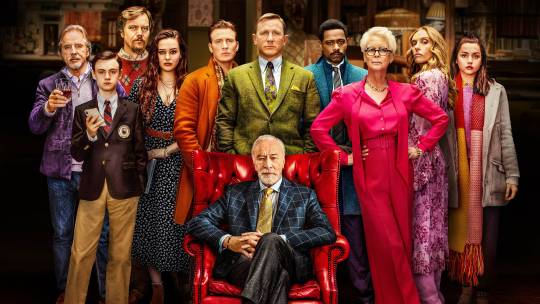
Murder, He Wrote.
“They say casting is 90 percent of directing and it was really true in this case.” Knives Out writer and director Rian Johnson tells us about the intricacies of whodunits, the joys of over-analyzing movies, and—yes—Star Wars.
From Hercule Poirot’s debut in an Agatha Christie novel in 1920, to the hard-boiled detectives of the 1930s, to the Pink Panther comedies, the whodunit was a perennially popular film genre—until its decline in the 1980s, when true-crime re-enactments took over. But, with Knives Out, writer/director Rian Johnson (Looper, Star Wars: The Last Jedi) is on a mission to reaffirm the whodunit’s rightful place on the big screen—and casually reinvent the form while he’s at it.
Knives Out has a gobsmacking ensemble, with Christopher Plummer (as writer Harlan Thrombey, the victim), Ana de Armas (as Marta, Thrombey’s nurse and confidant), Daniel Craig (as Benoit Blanc, the famous private detective who shows up to query Thrombey’s apparent suicide), and Lakeith Stanfield (as the investigating Lieutenant Elliott). Making up Thrombey’s extended, entitled family are Jamie Lee Curtis, Don Johnson, Chris Evans, Michael Shannon, Toni Collette, Riki Lindhome, K Callan, Katherine Langford and Jaeden Martell—all well fed by his wealth and determined to protect their piece of it.
It’s a Rian Johnson movie, so Noah Segan shows up as well, in perhaps his meatiest role yet, as a cop working with Stanfield. There’s also a delightful cameo from Frank Oz.
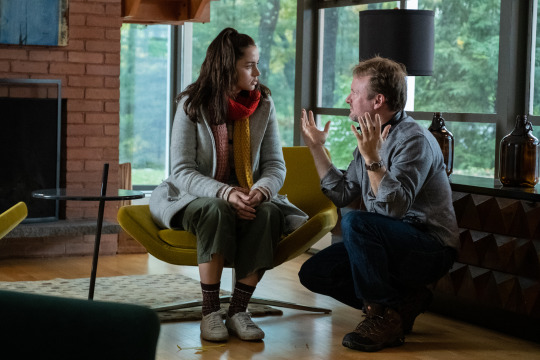
Rian Johnson directs Ana de Armas on the set of ‘Knives Out’.
Despite the lack of big-screen whodunits of late, there’s no shortage of audience enthusiasm for them, as evidenced by our ‘Murder Mystery’ Showdown, a great starting point for anyone looking to delve into the genre. Letterboxd members who have already seen Knives Out are very much enjoying what they see, with the film boasting a giant 4.2 average rating (at time of writing).
This is one of those films where you can just tell how much fun the cast is having, an aspect that Letterboxd member Wes nails in his review: “I’d really, really, really like to believe that Rian Johnson gathered all these actors in this giant house, hid some cameras everywhere, hit record, and none of what we saw was fictitious.”
Demi Adejuyigbe writes—in his charming Letterboxd review of the time he lunched with Johnson (!)—that the film is “absofuckinglutely phenomenal”. He marvels at how Knives Out stays one step ahead of what we expect from a whodunit: “How do you fool an audience that has come to be fooled? Johnson is so deftly able to get that joyful, wondrous reaction out of me by expertly controlling every aspect of the script and the direction in a way that makes it clear he sees the entire process as a symphony that he’s conducting, where the audience is just another instrument being played.”
Or perhaps Patrick Willems best encapsulates the joys of the film when he writes that Knives Out is “a movie as good as its sweaters (the sweaters are excellent)”. (The most popular sweater has its own story, here.)
When we got in a room with Rian Johnson recently, we naturally wanted to learn how he juggled such an impressive ensemble whilst navigating the twists, turns, and more twists of Knives Out’s plot.

Chris Evans and Ana de Armas wearing sweaters, Rian Johnson not wearing a sweater, on the set of ‘Knives Out’.
You’ve often talked about your lifelong love of the whodunit genre. How did you go about making your own? Rian Johnson: It’s very interesting, the whodunit genre. It’s one of my favorite genres. I love all the things about it. I also kind of agree with Hitchcock. Hitchcock hated the whodunit genre. To Hitchcock, the danger of the whodunit is: it’s a lot of build-up for one big surprise at the end, and that’s not very satisfying or fun. That’s why he was all about suspense. He would give the audience information early and then you’re in suspense and not just crime-solving. He would also mislead the audience, so you’d think you’re getting all the information early. And enough so that you’re leaning forward, you’re not sitting back. That’s Hitchcock’s whole deal.
So for me, what was interesting is: can I put the engine of a Hitchcock thriller in the middle of a whodunit? Have a whodunit that then turns into a Hitchcock thriller that turns back into a whodunit? That was kind of the starting point for me, from a genre-wonk point of view.
So then I started filling out, okay what would that actually mean? I’m talking around it because I don’t wanna spoil anything, but, okay if we did this and then that could be interesting. And then I started zooming in bit by bit and filling out what characters I would need for what plot points. All the details come later but it’s as ‘big picture’ as that.
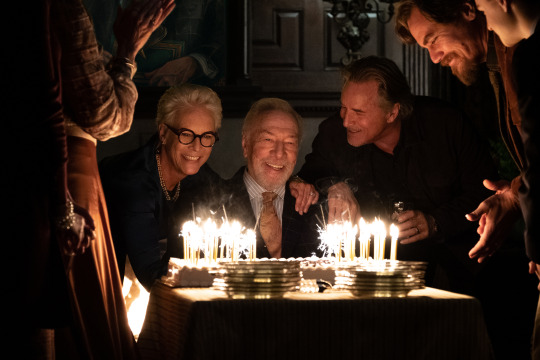
Jamie Lee Curtis, Christopher Plummer, Don Johnson and Michael Shannon in ‘Knives Out’.
Were there ever any alternative outcomes in play? Not really, because I didn’t really work, like, “if this happens, then that happens, then that happens”. I worked it like a satellite map. I zoomed back. I work in little notebooks and I have to draw one line and see the entire plot along that line. So it’s not like a game of Clue where I can pick out different solutions at the end; it’s kind of set because the shape of the whole thing determines a different kind of ending from the very inception of it.
Watching this, I thought about your film The Brothers Bloom, as that’s another ode to a somewhat specific genre—the con-artist film—in which your affection for that kind of film was also evident. How challenging is it to write and shoot films in genres you grew up loving? Any time I’m attacking a genre it’s because I deeply, deeply love it. The heart of it for me is always trying to distill the thing I love about it and set that as the goal-post and then find my own way to it. Whether it’s the con-man movie with The Brothers Bloom, or Star Wars as a genre, or this, it’s always about trying to get to the heart of what I love about something and then trying to put that on the screen so the audience will have as pure an experience of it as possible. And sometimes to give the audience the purest experience, you have to shake it a little bit, because… we’ve seen so many versions of it over the years that the audience can kind of ignore it. So sometimes you have to put it in a different context, like with Brick, with film noir or something. But the intent is always to give the audience the most sharp and vivid experience of what’s at the heart of it for me.
This film is a blockbuster of chemistry. Was it difficult to cast? Once we got Daniel on board, no. Once he was the centerpiece, I think everyone wants to work with him so it was like a snowball. Because then we got Michael Shannon, and everyone wants to work with him. And Lakeith Stanfield. So, no, the cast came together very, very quickly, just like everything else in this project. With these actors, my job is easy. They show up on set, they clicked in so easily. They’re such pros. They say casting is 90 percent of directing and it was really true in this case.
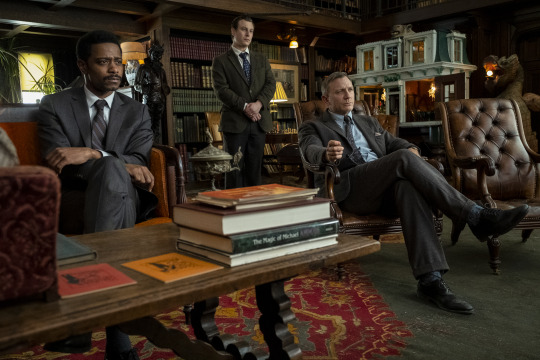
Lakeith Stanfield, Noah Segan and Daniel Craig in ‘Knives Out’.
Speaking of Daniel Craig, his character is a microcosm of the film in that he is not in any way like any detective that has come before, yet you cannot help but think of precedents. Were you consciously trying to make him unlike Hercule Poirot? When I started writing, I actually kinda got myself in trouble because I was thinking too much about Poirot. I love Poirot so much and I think I was thinking too much like: how do I make my Poirot? And so I started doing all this sort of quirky stuff, and throwing all these quirks in there, like maybe he has an eye patch and a peg leg maybe. It was just silly. And so finally I said “this is so stupid”, and I pulled all that stuff and I just said: “I’m gonna write this character very straightforward. The way that he needs to be for the script. And I’m gonna give him a Southern accent, because then he’s a fish out of water in New England. And then whoever I cast, I’m gonna believe that they’re gonna inhabit that character in such a way that he’ll be unique.”
I think what Daniel found—that is exactly what is at the heart of Poirot—is Daniel found kind of what’s funny about the character. Beyond the accent. He found the self-inflated, clownish aspect of him, while still maintaining a humanity and an intelligence, which is really what Poirot is. It’s why Peter Ustinov is my favorite Poirot—he gets what’s funny about the character. And like Columbo or like Miss Marple or any of the great fictional detectives, it’s that element that makes you not quite take him seriously until it’s too late and they’ve solved the whole case. I think that’s what Daniel keyed into more than anything else.
This feels like a film that people are going to pore over the details of, as they did with Looper. I love it because that’s part of what I love about those kinds of movies. First of all, let’s separate them, because with time-travel movies, the notion that a time-travel movie can make sense is absolute nonsense. So time travel is much more like the spells in Harry Potter than science, and anyone who thinks otherwise is fooling themselves. Except maybe Shane Carruth. Shane is the one person who can actually figure out time travel. Everyone else, it’s kind of like a fantasy element more than anything else.
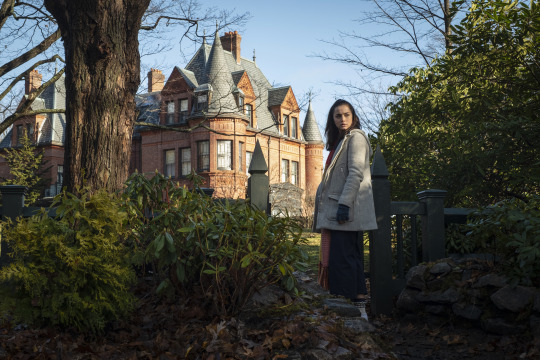
Ana de Armas in ‘Knives Out’.
So with Looper, I felt like I had to have it make narrative sense, but I didn’t feel the pressure of it having to work in every little detail, because it can’t. Whereas, it’s a little different with a whodunit because every screw has to be tightened and I can’t leave any loose ends. I do want people to be able to re-watch and dig in. But I’ll be a little more sad if they find things that don’t make sense. I’m sure they will, but it’ll actually make me a little sad if they do, because I’ll be like: “I messed up there”.
How do you feel about your films being subjected to that kind of scrutiny? I think it’s fun! That’s the thing: for a certain kind of moviegoer, that’s the pleasure you get—it’s almost like the kid who if you hand them a radio, you’re gonna wanna take it apart. If that’s what someone loves about watching a movie then I think that’s fantastic. I’ve done that with certain films. I’ve watched them over and over and tried to analyze, so I get [that] that’s part of the pleasure of it.
How are you feeling about your Star Wars experience? As a filmmaker, as a Star Wars lover, it was the best experience of my life. Everything about it. Writing it. Making it. The people I got to meet. The places I got to go. The experience I had putting it out. The last two years interacting with the fans has been so rewarding and so fantastic.
I feel like I always have to say that the bad part of that gets written about a lot because it’s interesting to write about. From being in the middle of the hurricane, I can tell you that 95 percent of my interactions with fans are absolutely lovely. That’s not to say they all even like the movie—some of them don’t, or some of them have issues with the film—but they’re all engaged and respectful and so deeply engaged in it in a way that when you make movies you only dream that people will engage with something that you made on that level. So no, for me, the whole thing top-to-bottom has been the most beautiful experience I can possibly imagine.
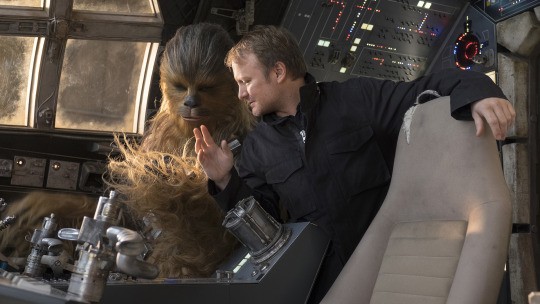
Rian Johnson directs Joonas Suotamo on the set of ‘Star Wars: The Last Jedi’.
Something that I know in my bones from being a Star Wars fan since I was five years old: everybody has a slightly different version of what Star Wars is to them, absolutely. That’s why I’m excited that stuff like [new Disney+ series] The Mandalorian can exist. The more Star Wars stuff we make, the more there’s gonna be a spectrum that gives different people the things that they want. But we also have to recognize that nothing is gonna give everybody what they want, and somebody is always gonna be upset.
What George Lucas did originally was make a movie that was straight from his heart, and expressed exactly what this world was to him. And expressed emotional truths in this world in a way that was resonant for him personally. I feel that every filmmaker who comes to Star Wars, that’s their job. Their job is not to take a survey and to see what is going to have the broadest demographic appeal. Their job is to speak from their heart and make a thing that resonates with what Star Wars is for them. And I think the more diverse filmmakers we have doing that, the more diverse Star Wars movies we’ll have, the more people will hopefully be happy and the less yelling there’ll be all around.
‘Knives Out’ is now in theaters. Comments have been edited for clarity and length. With thanks to Studiocanal.
#knives out#rian johnson#star wars#star wars the last jedi#whodunit#whodunnit#murder mystery#daniel craig#chris evans#jamie lee curtis#michael shannon#frank oz#clue#cluedo#crime#detective#hercule poirot#agatha christie#alfred hitchcock#hitchcock#don johnson#toni collette#christopher plummer#sweater#aran knit#aran sweater#sweater weather#ana de armas#letterboxd
5 notes
·
View notes
Text
3D, Part 2: How 3D Peaked At Its Valley by Vadim Rizov
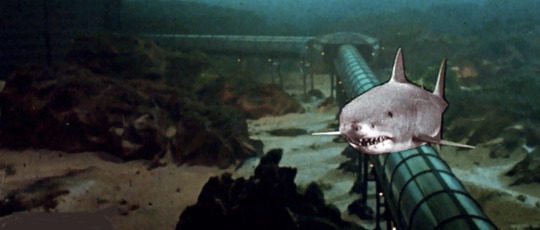
I didn’t expect to spend Thanksgiving Weekend 2018 watching ten 3D movies: marathon viewing is not my favorite experience in general, and I haven’t spent years longing to see, say, Friday the 13th Part III, in 35mm. But a friend was visiting, from Toronto, to take advantage of this opportunity, an impressive level of dedication that seemed like something to emulate, and it’s not like I had anything better to do, so I tagged along. Said friend, Blake Williams, is an experimental filmmaker and 3D expert, a subject to which he’s devoted years of graduate research and the bulk of his movies (see Prototype if it comes to a city near you!); if I was going to choose the arbitrary age of 32 to finally take 3D seriously, I couldn’t have a better Virgil to explain what I was seeing on a technical level. My thanks to him (for getting me out there) and to the Quad Cinema for being my holiday weekend host; it was probably the best possible use of my time.
The 10-movie slate was an abridged encore presentation of this 19-film program, which I now feel like a dink for missing. What’s interesting in both is the curatorial emphasis on films from 3D’s second, theoretically most disreputable wave—‘80s movies with little to zero critical respect or profile. Noel Murray considered a good chunk of these on this site a few years ago, watching the films flat at home, noting that when viewed this way, “the plane-breaking seems all the more superfluous. (It’s also easy to spot when these moments are about to happen, because the overall image gets murkier and blurrier.)” This presumes that if you can perceive the moments where a 3D film expands its depth of field for a comin’-at-ya moment and mentally reconstruct what that would look like, that’s basically the same experience as actually seeing these effects.

Blake’s argument, which I wrestled with all weekend, is that these movies do indeed often look terrible in 2D, but 3D literally makes them better. As it turns out, this is true surprisingly often. Granted, all concerned have to know what they’re doing, otherwise the results will still be indifferent: it turns out that Friday the 13th Part III sucks no matter how you watch it, and 3D’s not a complete cure-all. This was also demonstrated by my first movie, 1995’s barely released Run For Cover, the kind of grade-Z library filler you’d expect to see sometime around 2 am on a syndicated channel. This is, ostensibly, a thriller, in which a TV news cameraman foils a terrorist plot against NYC. It features a lot of talking, scenes of Bondian villains eating Chinese takeout while plotting and/or torturing our ostensible hero, some running (non-Tom Cruise speed levels), and one The Room-caliber sex scene. Anyone who’s spent too much time mindlessly staring at the least promising option on TV has seen many movies like these. The 3D helps a little: an underdressed TV station set takes on heightened diorama qualities, making it interesting to contemplate as an inadvertent installation—the archetypal TV command room, with the bare minimum necessary signifiers in place and zero detail otherwise—rather than simply a bare-bones set. But often the camera is placed nowhere in particular, and the resulting images are negligible; in the absence of dramatic conviction or technical skill, what’s left is never close enough to camp to come back out the other side as inadvertently worthwhile. I’m glad I saw it for the sheer novelty of cameos from Ed Koch, Al Sharpton and Guardian Angels founder Curtis Sliwa—all doing their usual talking points, but in 3D! But it’s the kind of film that’s more fun to tell people about than actually watch.
But infamous punchlines Jaws 3-D and Amityville 3-D have their virtues when viewed in 3D. The former, especially, seems to be the default punching bag whenever someone wants to make the case that 3D has, and always will be, nothing but a limited gimmick upselling worthless movies. It was poorly reviewed when it came out, but the public dug it enough to make it, domestically, the 15th highest-grossing film of 1983 (between Never Say Never Again and Scarface) and justify Jaws: The Revenge. Of course I was skeptical; why wouldn’t I be? But I was sucked in by the opening credits, in which the familiar handheld-underwater-cam-as-shark POV gave way to a severed arm floating before a green “ocean.” Maybe flat it looks simply ludicrous, but the image has a compellingly Lynchian quality, as if the limb were detached from one of Twin Peaks: The Return’s more disgusting corpses, its artifice heightened and literally foregrounded, the equally artificial background setting it into greater relief.
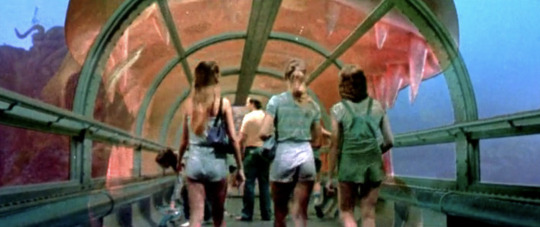
The film’s prominent SeaWorld product placement is, theoretically, ill-advised, especially in the post-Blackfish era; in practice, it’s extremely productive. The opening stretches have a lot of water-skiing; in deep 3D, the water-skiers serve as lines tracing depth towards and away from the camera over a body of water whose horizon line stretches back infinitely, producing a greater awareness of space. It reminded me of the early days of the short-lived super-widescreen format Cinerama, as described by John Belton in his academic history book Widescreen Cinema (recommended). The very first film in the format, This is Cinerama, was a travelogue whose stops included Cypress Gardens, Florida’s first commercial tourist theme park (the site is now a Legoland), which has very similar images of waterskiiers. Cinerama was, per the publicist copy Belton quotes from the period, about an experience, not a story: “Plot is replaced by audience envelopment […] the medium forces you to concentrate on something bigger than people, for it has a range of vision and sound that no other medium offers.” Cinerama promised to immerse viewers, as literalized in this delightful publicity image; Belton argues that “unlike 3-D and CinemaScope, which stressed the dramatic content of their story material and the radical new means of technology employed in production, Cinerama used a saturation advertising campaign in the newspapers and on radio to promote the ‘excitement aspects’ of the new medium.” There’s a connection here with the earliest days of silent cinema, short snippets (“actualities”) of reality, before it was decided that medium’s primary purpose was to tell a story. It didn’t have to be like that; in those opening stretches, Jaws 3-D’s lackadaisical narrative, which might play inertly on TV, recalls the 1890s, when shots of bodies of water were popular subjects. This is something I learned from a recent presentation by silent film scholar Bryony Dixon, and her reasoning makes sense. The way water moves is inherently hypnotic, and for early audiences assimilating their very first moving images, water imagery was a favorite subject. It’s only with a few years under its belt that film started making its drift towards narrative as default; inadvertently or not, Jaws 3-D is very pure in its initial presentation of water as a spectacular, non-narrative event.
If this seems like a lot of cultural and historical weight to bring to bear upon Jaws 3-D, note that it wasn’t even my favorite of the more-scorned offerings I saw that weekend, merely one that makes it easiest for me to articulate what I found compelling about the 3D immersion experience. I haven’t described the plot of Jaws 3-D at all, which is indeed perfunctory (though it was nice to learn where Deep Blue Sea cribbed a bunch of its production design from). I won’t try to rehabilitate Amityville 3-D at similar length: set aside the moronic ending and Tony Roberts’ leading turn as one of cinema’s most annoyingly waspish, unearnedly whiny divorcees, and what’s left is a surprisingly melancholy movie about the frustrations, and constant necessary repairs, of home ownership. There’s very little music and a surprising amount of silence. The most effective moment is simply Roberts going upstairs to the bathroom, where steam is hissing out for no apparent reason and he has to fix the plumbing. The camera’s planted in the hallway, not moving for any kind of emphasis as the back wall moves closer to Roberts; it doesn’t kill him and nothing comes of it, it’s just another problem to deal with (the walls, as it were, are settling), made more effective by awareness of how a space whose rules and boundaries seemed fixed is being altered, pushing air at you.
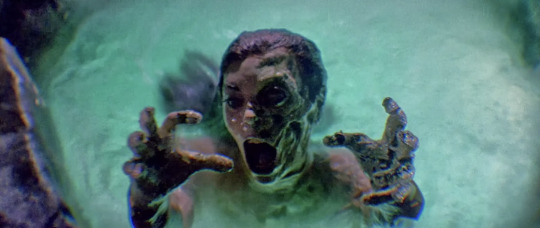
Watching a bunch of these in sequence, some clear lessons emerge: if you want to generate compelling depth by default, find an alleyway and block off the other half of the frame with a wall to present two different depths, or force protagonists to crawl through ducts or tubes. This is a good chunk of Silent Madness, a reasonably effective slasher film that, within the confines of its cheap sets and functional plotting, keeps the eye moving. It’s an unlikely candidate for a deep-dive New York Times Magazine article from the time period, which is well worth reading in full. It’s mostly about B-movies and the actresses trying to make their way up through them, though it does have this money quote from director Simon Nuchtern about why, for Bs, it’s not worth paying more for a good lead actress: “If I had 10,000 extra dollars, I’d put it into lights. Not one person is going to say, ‘Go see that movie because Lynn Redgrave is in it.’ But if we don’t have enough lights and that 3-D doesn’t pop right out at you, people are going to say, ‘Don’t see that movie because the 3-D stinks.’” Meanwhile, nobody appears to have been thinking that hard while making Friday the 13th: Part III, which contains precisely one striking image: a pan, street morning, as future teen lambs-to-the-slaughter exit their van and walk over to a friend’s house. A lens flare hits frame left, making what’s behind it briefly impossible to see: this portion of the frame is now sealed off under impermeable 2D, in contrast to the rest of the frame’s now far-more-tangible depth. The remainder of the movie makes it easy to imagine watching it on TV and clocking every obvious, poorly framed and blocked 3D effect, from spears being thrown at the camera to the inevitable yo-yo descending at the lens. (This is my least favorite 3D effect because it’s just too obvious and counterproductively makes me think of the Smothers Brothers.)
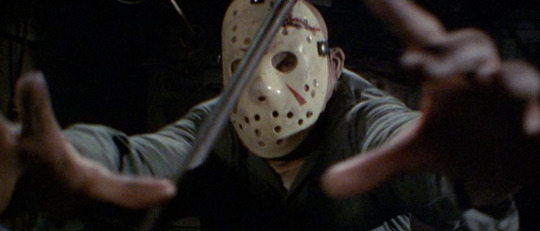
Friday the 13th was the biggest slog of the 3D weekend, and the one most clearly emulating 1981’s Comin’ at Ya! I am not going to argue for that movie, either, which is generally credited with kicking off the second 3D craze; it’s a sludgy spaghetti western that delivers exactly as its title promises, using a limited number of effects repeatedly before showing them all again in a cut-together montage at the end, lest you missed one in its first iteration. It’s exhausting and oddly joyless, but was successful enough to generate a follow-up from the same creative team. Star Tony Anthony and director Ferdinando Baldi (both veterans of second-tier spaghetti westerns) re-teamed for 1983’s Treasure of the Four Crowns, the movie which (two screenings in) rewired my brain a little and convinced me I should hang around all weekend. This is not a well-respected film, then or now: judging by IMDb user comments, most people who remember seeing it recall it playing endlessly on HBO in the ‘80s, where it did not impress them unless they were very young (and even then, perhaps not). Janet Maslin admitted to walking out on it in her review; then again, she did the same with Dawn of the Dead, and everyone loves that.
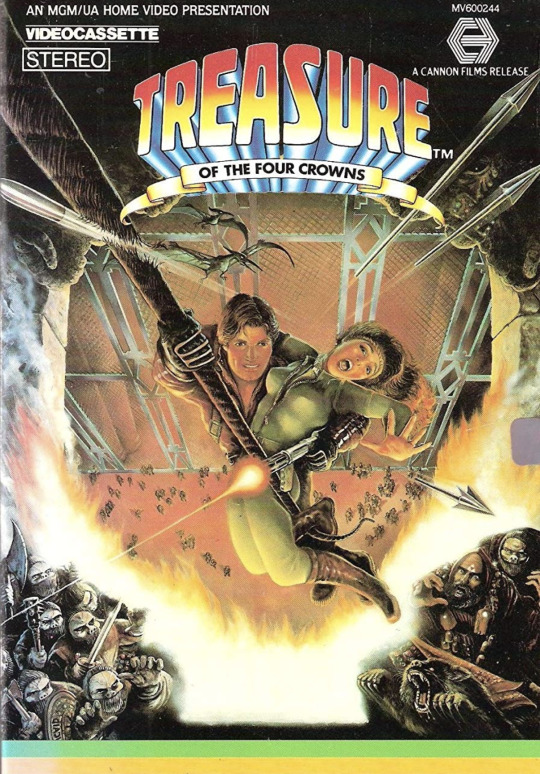
An unabashed Indiana Jones copy, Treasure begins strong with a lengthy opening sequence of tomb raider J.T. Striker (Anthony) dropping into a cave, where he’s promptly confronted not only with a bunch of traps but, for a long stretch, a small menagerie’s worth of owls, dogs, and other wildlife. There are a lot of animals, and why not? They’re fun to look at, and having them trotted out, one after another, is another link back to silent cinema; besides water, babies and animals were also popular subjects. The whole sequence ends with Striker running away from the castle above the cave, artifact retrieved, in slow-motion as Ennio Morricone’s score blares. There is, inevitably and nonsensically, a fireball that consumes the set; it unfolds luxuriously in detailed depth, the camera placed on a grassy knoll that gives us a nice angle to contemplate it looking upwards, a nearly abstract testament to the pleasures of gasoline-fueled imagery. Shortly thereafter, Striker is in some European city to sell his wares, and in every shot the camera is placed for maximum depth: in front of a small city park’s mini-waterfall, views of streets boxed in by sidewalks that narrow towards each other, each position calibrated to create a spectacular travelogue out of what’s a fairly mundane location. There’s an expository sequence where Striker and friends drop into a diner to ask about the whereabouts of another member of the crew they need to round up. Here, with the camera on one side of a bar encircling a center counter, there are something like six layers of cleanly articulated space, starting with a plant’s leaves right in front of the lens on the side, proceeding to the counter, center area, back counter, back tables and walls of the establishment. Again, the location is mundane; seeing it filleted in space so neatly is what makes it special.
The climax finally convinced me I was watching forgotten greatness. This is an elaborate heist sequence in which, of course, the floor cannot be touched, necessitating that the team perform all kinds of rappelling foolishness. At this point I thought, “the only way I could respect this movie more is if it spent 10 minutes watching them get from one side of the room to another in real time.” First, the team has to gear up, which basically means untangling a bunch of ropes—clearly not the most exciting activity. The camera is looking up, placed below a team member as they uncoil and then drop a rope towards the lens. This is a better-framed variant of the comin’-at-ya principle, but what made it exciting to me was the leisurely way it was done: no more whizzing spears, but a moment of procedural mundanity as exciting as any ostensible danger. Basic narrative film grammar is being upended here: if a rope being dropped is just as exciting as a big, fake rip-off boulder chasing our hero down the cave, then all the rules about what constitutes narrative are off—narrative and non-narrative elements have the exact same weight, and even the most mundane, A-to-B connective shot is a spectacular event.
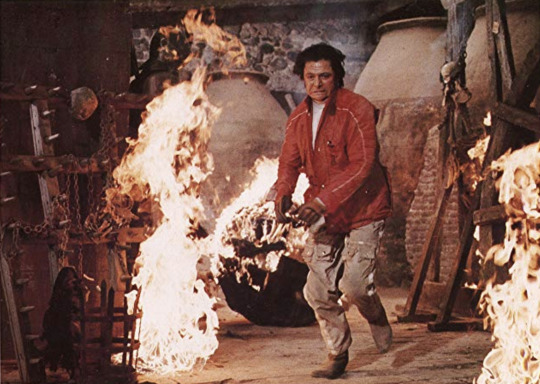
This isn’t how narrative cinema is supposed to work, and certainly not what James Cameron’s conception of good 3D proposed. The movie keeps going, building to a bizarrely grim climax involving a lot of face-melting, scored by Morricone’s oddly beatific score, which seems serenely indifferent to the grotesqueness of the images it’s accompanying. (This is a recurring trait in the composer’s ‘80s work; the score for White Dog often seems to bear no relation to the footage it’s accompanying.) That would make the movie oneiric and weirdly compelling even on a flat TV, but everything preceding convinced me: 3D can be great because it’s 3D, not because it serves a story. I’ve spent the last decade getting more angry about the format than anything, but that was a misunderstanding. Treasure of the Four Crowns is, yes, probably very unexceptional seen flat; seen in all three dimensions, it’s a demonstration of how 3D can turn banal connective tissue and routine coverage into an event. The spectacle of 3D might never have been its potential to make elaborate CG landscapes more immersive, something I still haven’t personally been convinced of; as those 19 non-CG shots in Avatar showed (undermining Cameron’s own argument!), 3D’s renderings of the real, material world and objects have yet to be fully explored. 3D’s ability to link film back to its earliest days is refreshing, in the way that any rediscovery of forgotten parts of film language can be, while also encouraging thought about all the things narrative visual language hasn’t yet explored, as if 3D could take us forwards and backwards simultaneously. In any case, I’m now won over—ten years after Avatar, but better late than never.
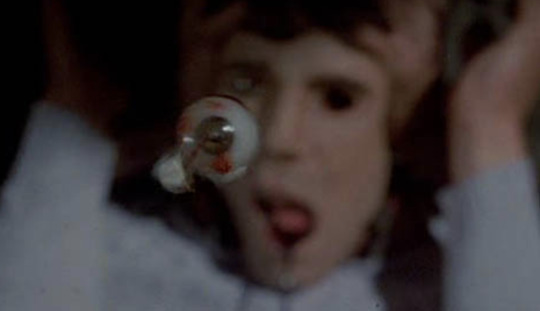
#3-d#3-d movie#3-d cinema#treasure of the four crowns#avatar#this fashion insider’s new modern engagement ring is making jaws drop#jaws 3d#friday the 13th part iii#cinemascope#cinerama#cypress gardens#widescreen#amityville 3d#scarface#never say never again#run for cover#oscilloscope laboratories#film writing#film essay#o-scope labs#musings#beastie boys
10 notes
·
View notes
Text
Against The Ropes: Arrow 6x02 Review (Tribute)
Arrow delivers another strong episode with “Tribute.” We are on a roll! As I've said, I enjoy Oliver most when he’s up against the ropes and punching his way out. In “Tribute” Oliver is fighting against three heavy weights: Samandra, William and Anatoly. He’s not the only one backed into a corner though. John Diggle is too.
Let’s dig in...
Oliver Queen
Oliver doesn’t always have to punch his way out of a problem. He is an intelligent man with a knack for strategic thinking. The photo of Oliver as the Green Arrow puts him in that frame of mind, which is always enjoyable to watch. He also needs a worthy advisary for this cat and mouse game to be any fun, which is what Agent Watson (FBI!!!!!) brings to the table.
However, I don't think Oliver anticipated the emotional fallout from this photograph. It leads to some very interesting conversations with William, and if you can believe it, Rene. By adding William to the mix, "Tribute" suddenly becomes more about Oliver protecting his son from the consequences of being the Green Arrow rather than himself.

Source: olivergifs
Oliver handles the press with all the schmooze and charm of Tony Stark, but this is DC and not Marvel. We aren't dropping that name. No sir. There are rules about that.

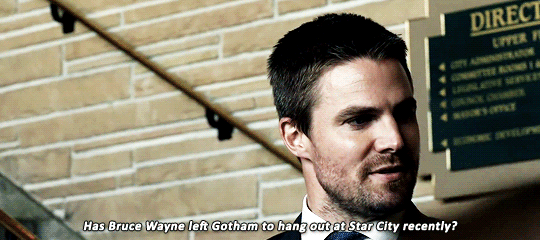
Source:queensarrow
Everybody knows what a huge Batman fan I am, so yes I absolutely squealed at the mention of the Caped Crusader,

but now Arrow opened the door. The image of Bruce Wayne hanging out in Star City, drinking a beer with Oliver while talking dead parents and vigilante-ing is one I so desperately need.
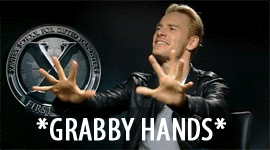
All wishful thinking aside, Oliver's point (and Stephen's line) have a logical point. Any photo can be doctored. A photo doesn't prove anything. Unless the photo actually does prove something, such as this, but that's just details. Keep on dancing Oliver!
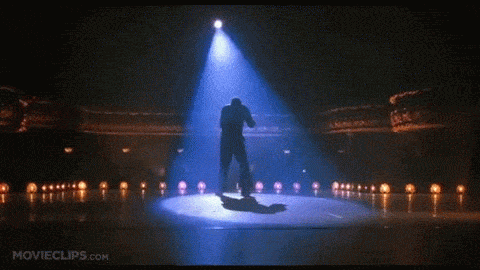
Agent Watson is not buying Oliver's charm. She absolutely believes he is the Green Arrow. I mean... the scruff and handsome cleft chin are evidence enough.

The dodge and weave is something that's been missing since Quentin discovered Oliver's identity. These scenes with Watson feel very reminiscent of Season 1. I also appreciate that Arrow didn't ignore the history between Quentin and Oliver. There is no emotional baggage with Watson like there was with Lance. Quentin's rage over Sara certainly put Oliver in his crosshairs, but Watson isn't Lance. There's no messy history with Oliver. It makes her investigation simpler. This is just about the Green Arrow.
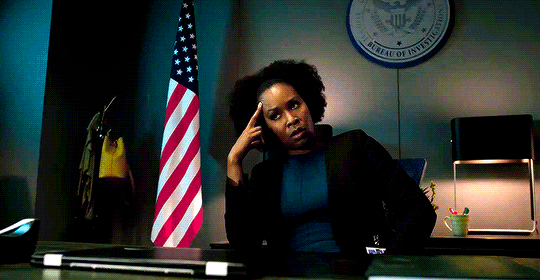
Source:queensarrow
Things come to a head when Watson wants to start issuing subpoenas - including one for William. It leads to an interesting confrontation with Oliver. In Season 1, Oliver would have pretended to be the lazy, playboy, billionaire's son. A man too stupid and too selfish to be The Hood.

Source @olliequeengifs
Oliver has to change his tactics because his public image has changed.
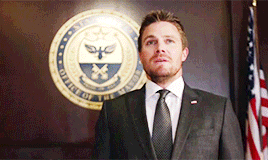
Now, he's the mayor. He's a man who cares deeply for his city, but does so within the confines of the law. Oliver comes dressed in a crispy grey suit. He is the perfect image of a law abiding citizen. This "image" Oliver is presenting to Agent Watson is much closer to who Oliver Queen truly is. Yet, the charming slickness of the playboy remains. Only now Oliver isn't too stupid or selfish to save the city. He's simply too busy already saving it. During the day. As mayor.
Oliver tells Agent Watson he is an open book - except when it comes to William. Oliver is warm, accommodating and gracious. Until he's not.
“If I really am the man you think I am, how far do you think such a man would go to keep his son from being scrutinized?”

It's a not so subtle threat. Oliver's voice starts off light, a charming little smile playing on his lips, but by the end his voice drops to that familiar lower octave. His smile disappears and he fixes a steely gaze on Agent Watson. He may be dressed as Oliver Queen, but the Green Arrow is in the room too. Neither the suit or the hood is playing. Not when it comes to William. If there was ever a scene in which Oliver perfectly walks the tightrope of his two selves - this is it.

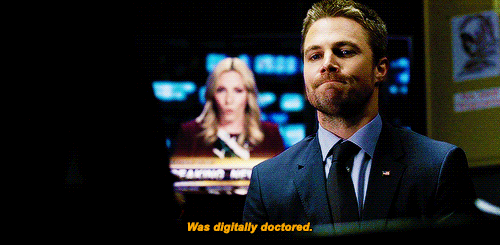
Source: olivergifs
Proof that the photograph is doctored arises just in time (thanks Felicity and Curtis!).
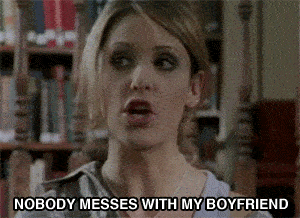
It takes care of the immediate Agent Watson problem, although not for good. However, this photograph unearthed some long latent fears within William. Fears that will not be solved with quick thinking tech.
William is beaten up by some much larger eighth graders who apparently lack cognitive thinking skills of any kind. At first Oliver is met with a stony silence when he presses William about what happened. (He gets that from you Oliver). Eventually William cracks though and tells Oliver what happened.
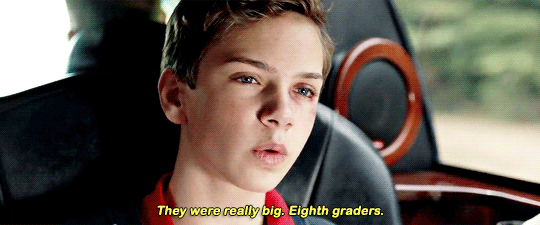
Source: arrowsource
The older kids were teasing William about Oliver "not being there for him" and being the Green Arrow.
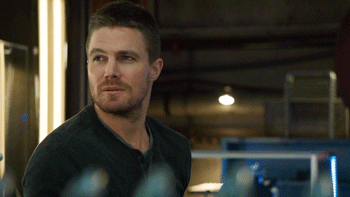
Now, someone is gonna have to walk me around this logic bend cause... WTF? How is Oliver being the Green Arrow mean he's not there for William as his father? You know what? I'm just gonna stop. Bullies never make sense.
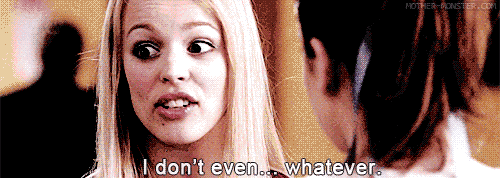
The first thing Oliver tells William is to go for the nose.
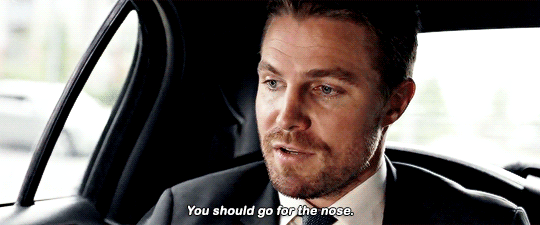

Source: arrowsource
YEAH BABY!

This is the Green Arrow parenting I want to see. Anytime anyone messes with my kid I want to tear their head off. We are sympatico Oliver.
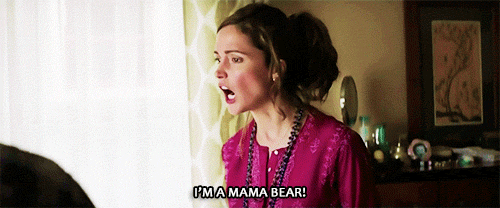
Obviously, we want kids to work through their differences. No need to @ me about the importance of children working through their differences without violence. It's also important for a child to defend themselves when being attacked, especially if you are Oliver Queen's son. This is Oliver's world. We saw real parenting confidence in him for the first time. He knows how to handle these types of situations. Oliver teaching William strategy and how to throw a punch is equally as important as math homework in this world.

However, the physical challenges William are the easy problems. It's the emotional ones that are the humdingers for Oliver. William is angry with Oliver for ditching him in the limo to go Green Arrow. Sometimes I want to punch The Flash too William. I RELATE KID.
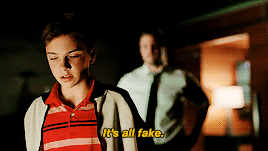
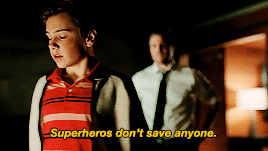
Source: westallenolicitygifs
What a heartbreaking line.
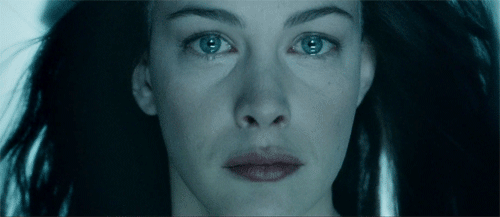
William has gone from a kid who believed so absolutely in the power of The Flash and the Green Arrow to save lives. However, when it mattered the most nobody could save his mother. Not even the Green Arrow. It brings the much larger issues going on inside William to the surface.
Oliver: I will always come back.
William: Just like my mom?
He’s got ya there Oliver.
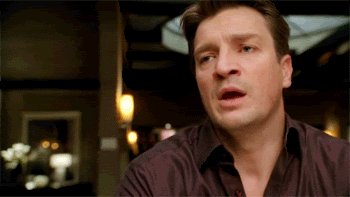
Most children do not worry about their parents dying. In their eyes we are invincible. We are immortal. Until we are not. Children only worry about their parents dying when they are given a reason to.
William has been given more than enough reasons to worry. His mother is dead and his father goes out, night after night, to fight the worst criminals the world has ever seen. Samantha's death is enough to make William fear losing his father, even if Oliver was a mailman,
However, William shows real self awareness when he tells Oliver the fear he carries is worse because his father willfully throws himself into life or death situations. The circumstances surrounding Samantha's death were out of her control. William understands that on some level and that's scary enough. It’s different with Oliver. Every time he leaves the house William fears losing him. However, Oliver’s extracurricular activities magnify that fear ten fold and with good reason.
Oliver tries to reassure William that he has everything under control. That he can handle any bad guy thrown at him.
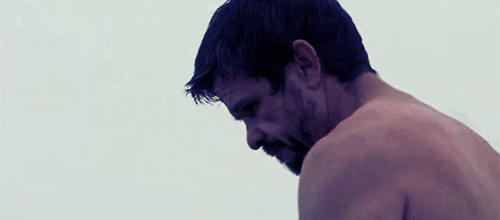
*whistling*
William: What if you can't? I'll be alone. I'll have nobody.
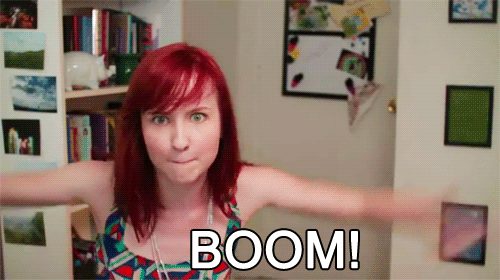
There it is. What I suspected William is truly afraid of because of course that's what he is afraid of. William argues Oliver can't understand the fear and pain he carries, but he's wrong. Oliver does understand all too well.
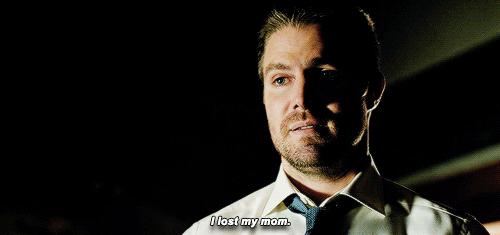

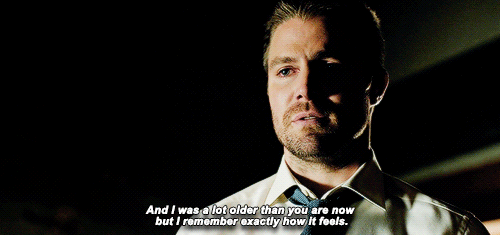
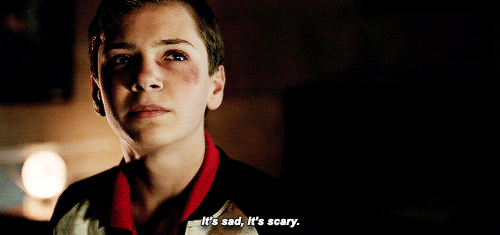
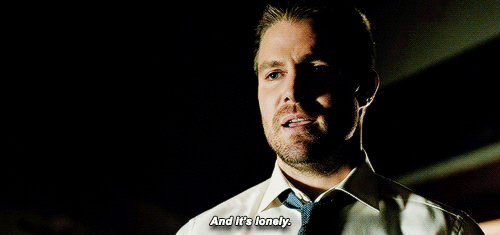
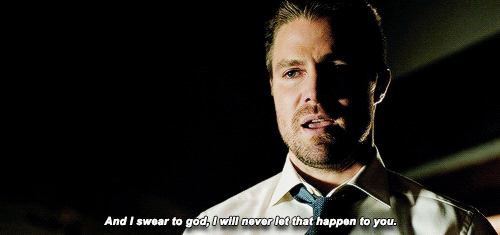
Source:olivergifs
The image William paints, the one of being all alone, is one his father has lived. Oliver is an orphan. Yes, he may have been older, but Oliver understands the pain and loneliness William feels and fears. He would do anything to protect William from it.
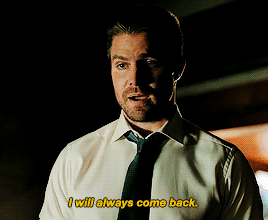
Oliver makes William a promise. However, it is William's response to it that is so astounding.

Source: westallenolicitygifs
Oliver is not God. William knows his father is just trying to reassure him, but this promise is not in Oliver's control. Oliver cannot bend circumstances to his will. He is not invincible. He is not immortal. It's an inescapable truth that comes with losing a parent.
It leads to a beautiful scene with... RENE???

The description of 6x02 said Oliver goes to a surprising source for parenting advice and boy were they right. Rene can be off putting and downright offensive, but he can also be really funny and gentle. It's in these softer moments with the character that I like him best. One of my chief complaints with Arrow is that, despite having a large cast, the same characters interact all the time. An emotional moment between these two characters is a nice change of pace from their usual sardonic banter.
Oliver: I’ve never lied to my kid before.
The truth is - William is right. Every time Oliver is in the field he may not come back. No one has to tell Oliver Queen about the risks of being the Green Arrow. He absolutely understands and accepts them. If he wasn't willing to sacrifice his life then he wouldn't be out there in the first place.
The problem is Oliver is not only responsible for himself now. In some ways, it's the same reasons Oliver feared being in a relationship with Felicity.
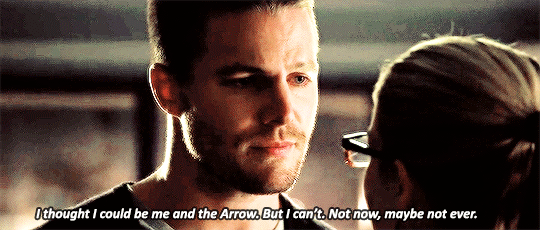
He didn't want her to be a target or put her life in danger. Life as the Green Arrow would always interfere with life as Oliver Queen. However, Felicity is a grown woman who can make her own decisions. She's also perfectly capable of taking care of herself. William is none of those things. For the first time, Oliver has someone who is truly dependent on him. So, the question becomes - what is Oliver willing to sacrifice for his child? What is he willing to do to make William feel safe and secure?
The first step is to only make William promises Oliver can keep. Rene is right. Little white lies are often a necessary parenting tool, but no parent can promise their child they'll always come home. Especially not to a child who lost a mother. When William lost his mother he lost his tether. Now he's just floating, listless and afraid. Oliver needs to give William a new tether.



Oliver admits he was wrong. Stephen Amell does such a wonderful job in this scene showing how much it physically pains Oliver to say those words, especially to his son.
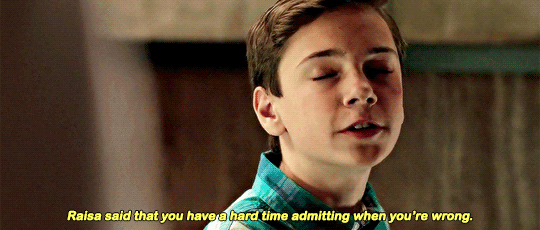
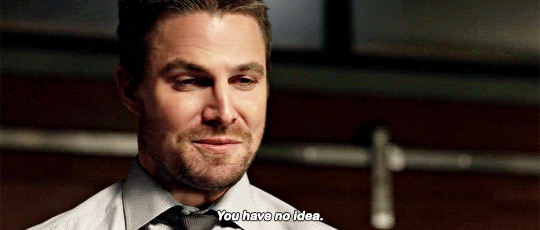
Source:arrowsource
HA! Raisa giving William insider tips about Oliver is my lifeblood.
The first promise Oliver makes is:
“I am going to do everything in my power forever to make sure you don't end up in this world alone. I know you think that isn't up to me and that's a fair and smart point, which is why I think I've found so that maybe it can be.”
This promise contains some very interesting phrasing. On the surface it seems like Oliver is hanging up the hood, which by the end of the episode, is exactly what he does. However, the show is called Arrow. He's not hanging up the hood forever. So, how does Oliver keep this promise to William if he puts on the hood again?
I am going to do everything in my power forever to make sure you don't end up in this world alone.
The Season 6 theme is family. The family you are born into and the family you build. Oliver built a family after he lost his parents. He combated the pain and loneliness with love and friendship. Some of that family includes blood,
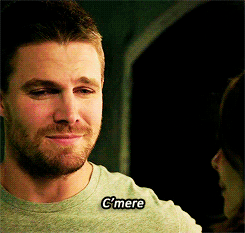
but a lot of it doesn't.
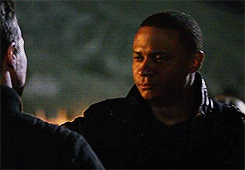
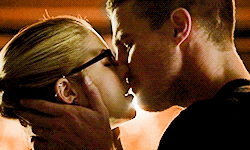
He needs to combat the fear, pain and loneliness in William the same way - with love and friendship. Oliver needs to build a family that extends beyond just the two of them. So, no matter what happens to Oliver, William knows he will always be loved, he will always be taken care of and he will never be alone. The more Oliver folds William into the family he built the less fearful his son will be. Oliver can never replace William's mother, but he can help William find security in this new tether.
Now, don't go freaking out on me that Oliver Queen is going to die. That's not the point of this. This isn't foreshadowing of Oliver's death. I don’t belive that’s where we are headed. We danced that dance in Season 3.

Oliver doesn't fear death. He fears life. The challenge of his hero's story is in living - not dying. However, Arrow has to address the dangers of vigilantism and the realities of parenting. Arrow is pushing Oliver down the road of a big and beautiful life. One filled with meaning, purpose, love, friends and children. I wonder what’s one way Oliver can expand his family. Hmmm...

But first, William must feel secure with his father before he's ready to expand beyond Oliver. So, this time away from the Green Arrow is incredibly important.
It is not forever though. Eventually, William will come to the decision every person who loves Oliver Queen arrives at. He will learn the Green Arrow is a vital part of who his father is and tell Oliver to suit up again. Essentially, William will join Team Arrow. Maybe he won't be out on the street fighting (not yet anyway), but there are other ways to help. For William, it will be sharing his father with the city. Is that a lot to ask of a ten year old boy? Yes, but that's the point. Selflessness often requires some kind of sacrifice. After all, William is Oliver Queen's son.
John Diggle
What happened to John on Lian Yu is finally revealed!
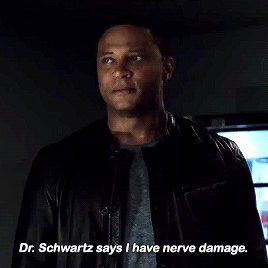
Source: dctvpoc
Yes, he caught shrapnel in his shoulder. Yes, it caused nerve damage. Plus 20 points to everyone who guessed correctly. Minus 100 to every entertainment website reviewer who said it was only mental.
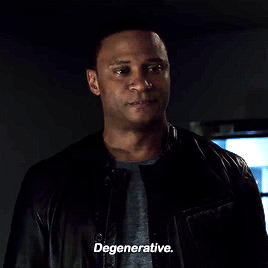
However, I was not expecting it to be DEGENARATIVE. You mean it's going to get WORSE?
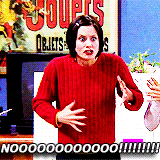
Minus 100,000 points to everyone because we all lose when John Diggle is in pain.

John is still refusing to fire his gun, because ya know, aim is important. In his defense, Diggle is pretty handy without the gun too. However, Dinah remains concerned. She feels John is compromised out in the field, which puts lives at risk. Dinah wants John to tell Oliver the truth. Diggle wants Dinah to quit bugging him about it.

It's not until Dinah is nearly choked to death that Diggle decides she's right. Diggle needed the gun to save Dinah's life, but he couldn't trust his aim. Not unlike what we saw with Rene last week. Dinah is able to save herself (FOR I AM WOMAN HERE MY ROAR), but John cannot ignore the potential threats to his teammates lives.

So... Rene was almost killed last week when Diggle couldn't fire his gun. However, it's not until DINAH is almost killed that John decides to fess up. Make what you will of that. I’m not saying there’s romance going on right now. I just found it interesting.
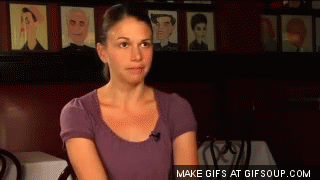
Diggle is firm in his decision to tell Oliver the truth right up until Oliver asks him to be the Green Arrow. There's a moment earlier in "Tribute" when Dinah asks John if he's okay. Diggle immediately starts talking about Oliver and the microscope he's under.

This frames Diggle's mindset perfectly. For six years, Diggle has put Oliver first. John has been there every step of the way helping Oliver with the challenges he's faced, his moral compass and his emotional evolution. This mission, and being Oliver's best friend, has given John a sense of purpose too. John isn't good at putting himself first, which is exactly what this type of injury requires.
There is only one man Oliver would entrust the city to: John Diggle.
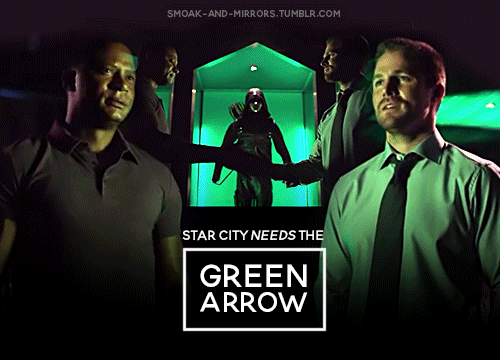
Source: smoak-and-mirrors
What Oliver is asking of John is an enormous undertaking. Diggle also knows what the hood and this mission means to Oliver. The only way Oliver is able to walk away is because he knows he's leaving the team and city in good hands. Perhaps, even better hands.
John keeps quiet about the nerve damage because he doesn't want to let Oliver down. He knows William needs Oliver more than ever. John wants to give Oliver time with his son the same way Oliver wanted to give Diggle time with his daughter.
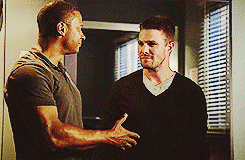
Diggle says nothing, so Oliver can walk away. He's putting Oliver Queen first because that's all John Diggle knows how to do. It's also what Oliver would do for him. These two are bromance goals y'all.
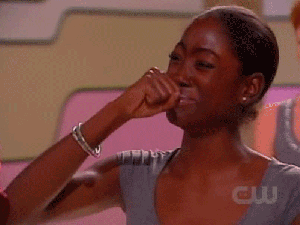
There's some serious logistical issues here. If Diggle isn't capable of being in the field as Spartan then he sure isn't as Green Arrow either. How shooting a bow and arrow/crossbow is any easier than a gun is beyond me.

Arrow better come prepared with a sciencey answer or else I'm calling shenanigans. Regardless, we get a "John Diggle as Green Arrow" centric episode next week and I AM HERE FOR IT.
Felicity Smoak
AND THUS FELICITY SMOAK'S COMPANY IS BORN. We've waited a long time for this my friends.
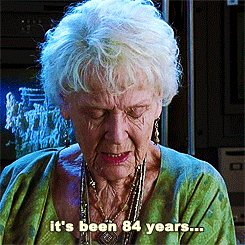
Felicity spends most of "Tribute" trying to help Oliver wriggle out of this photograph disaster and talking employment with Curtis.
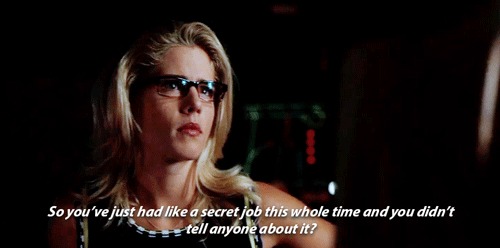

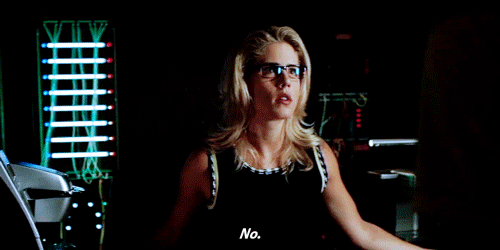
Source: sharingmyworld
Yes, that's right. Arrow finally addresses how everyone makes a living.
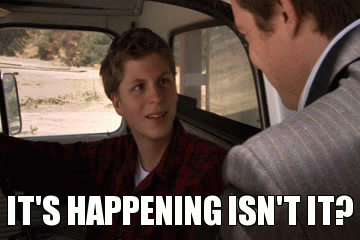
No you are not living in a parallel dimension. This is still earth. One can only surmise from this scene that the impossible can happen.
Curtis lets it slip that he's been doing a little coding on the side, because he didn't take a dime from Paul in the divorce. Yeah, Paul was a physical therapist. They make pretty good money. That tracks. Also, their divorce was finalized? Damn those go quick when you don't have kids. Yeesh.
Felicity's Palmer Tech severance is starting to dry up which feels like the truest thing Arrow has ever said because do you know how expensive her clothes are? I DO. I SHOP FOR THEM. THEY ARE INSANE.
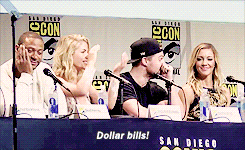
She wants Curtis to toss her some of his side coding business. To Curtis' credit, he does say the coding he's doing is a waste of Felicity's talent.
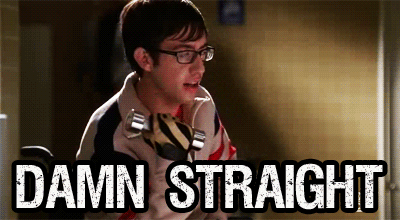
Felicity ultimately agrees and instead of coding beneath her skill set or working in the dreaded Tech Village again, she decides to go into business for herself - with Curtis as her partner. Felicity wants to team up and make more cool stuff.
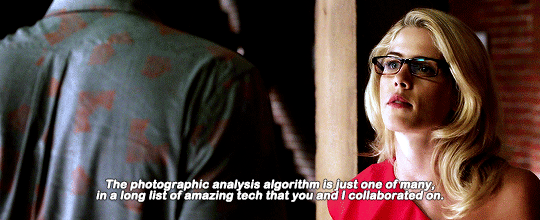
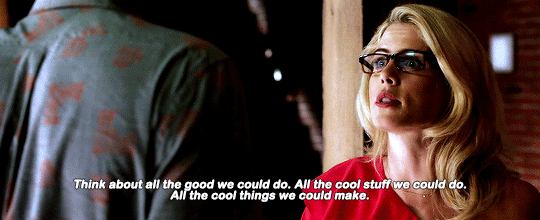
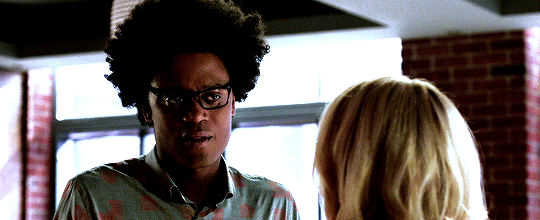
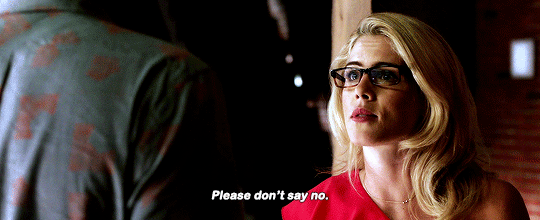
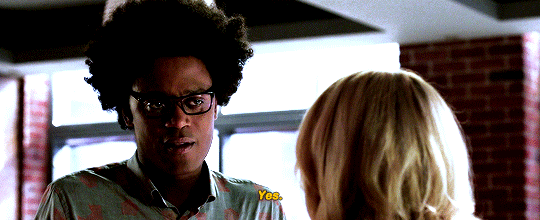
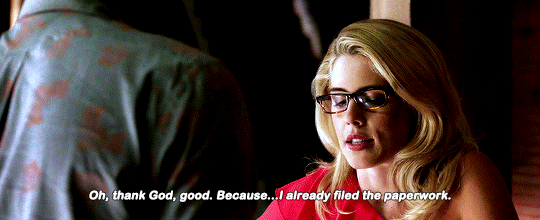
Source: felicitysmoakgifs
Her absolute insistence that her name comes first throughout the episode, however, is my spirit animal.
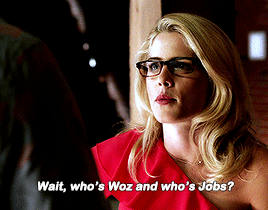

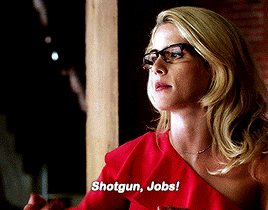
Source: felicitysmoakedit
Felicity is 100% Jobs.
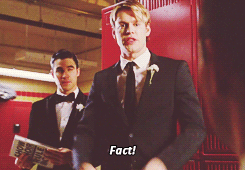
I'm not annoyed Felicity is teaming with Curtis. We knew it was coming. However, my one complaint is it seems like Arrow is constantly trying to give Curtis something to do. Since when does a Felicity Smoak algorithm not work?

Source: oliverxfelicity
Arrow needs to avoid the trap of dumbing Felicity down so Curtis can contribute. They need to push their separate talents merging into one great idea, rather than Curtis "fixing" something Felicity made.
That said, I am really excited this storyline is finally getting off the ground. Perhaps, Felicity and Curtis' first invention can be something to treat degenerative nerve damage.
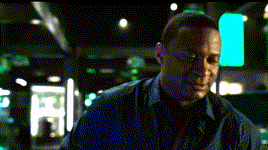
Olicity
Not a lot of Olicity in "Tribute," but never fear. This is a marathon, not a sprint. Felicity is obviously extremely worried about Oliver.


Source:westallenolicitygifs
Bae is trouble and she is NOT having it. She insists Oliver LAWYER UP, but he doesn't want to look like he has anything to hide.
Agent Watson: Do you know the kind of person who says that?
Oliver: No.
Agent Wilson: The kind that needs a lawyer.
I've watched enough crime shows to know this is absolutely true. I guess I’m done with the book learnin’.
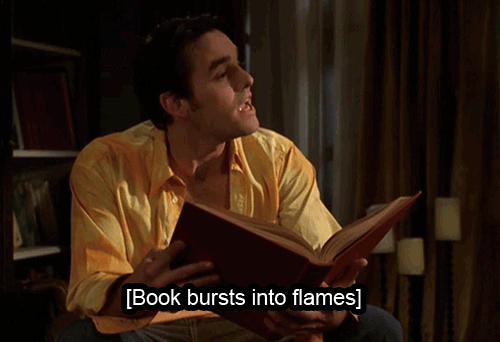
There's a couple "so married" moments too.
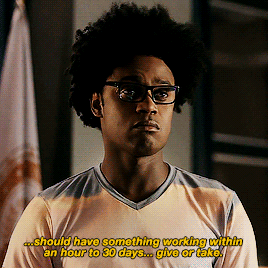
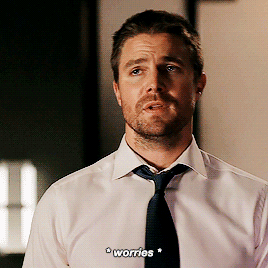
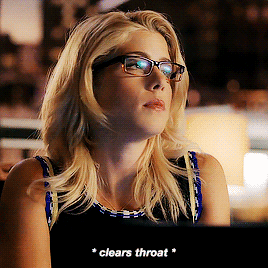
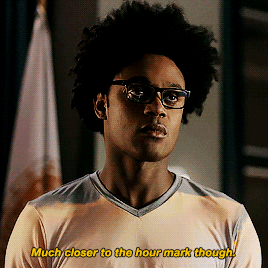
Source:westallenolicitygifs
Felicity signals Curtis to veer closure to the hour mark versus 30 days for the completion of the photograph analysis to ease Oliver's stress. Then, when Oliver questions whether or not Felicity sent them to the correct location we get this gem of interaction.
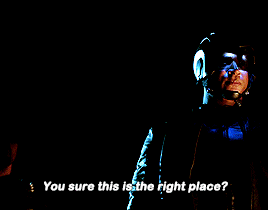
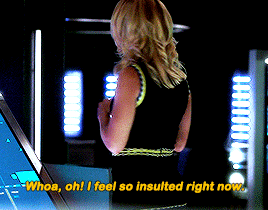
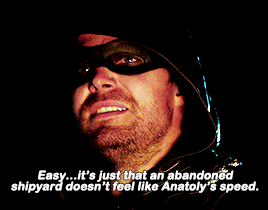
Source: oliverxfelicity
Felicity:
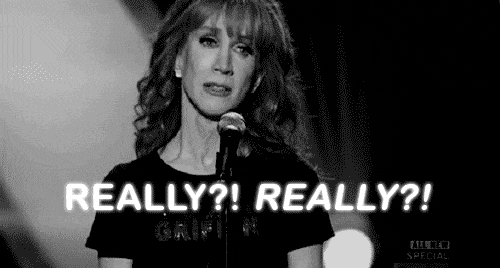
Don’t question the wifey, Oliver.
It's a little moment, but I loved when Felicity told Curtis that before the photograph her biggest worry was finding another job. It wasn't her relationship with Oliver or William. It's just another little signal that Felicity and Oliver are on the same page. Everything will fall into place when the time is right.
However, the best is a “blink and you’ll miss it” moment.

Barry was in the speed force for the last six months. He wouldn’t have been able to give Wiliam that backpack. So... isn’t it more likely FELICITY did? Just a subtle way she can show William she cares without overwhelming him. She’s watching from the sidelines waiting for the right time to go in.
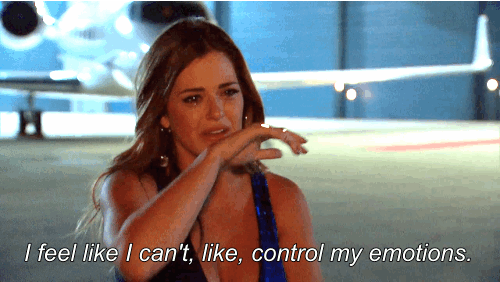
I don’t care if I’m wrong. THIS IS WHAT HAPPENED. I decided.
Anatoly
Anatoly is back and he's a lean, mean, killing machine. He's been outed by the Bratva for being too soft due to his friendship with Oliver. He's out to prove he's anything but. I'm almost as upset over Anatoly and Oliver's break up as I was over Olicity's.

Anatoly puts a bullet in his hostage right in front Oliver. HARSH. However, Oliver is not able to return Anatoly's kill or be killed sentiment. One reason is because of what he learned from Adrian Chase. The other is because Oliver still cares for Anatoly. He doesn't want to kill him and Anatoly knows it. This will add an interesting push/pull layer between the two characters.
It seems like Anatoly is still adhering to some kind of code, insisting he's still an honorable man. He didn't release the photo of the Green Arrow. That wouldn't be playing fair. Which, of course, begs the question who did? (My money is on Cayden James since Felicity's algorithm was stumped at first).
Anatoly reflects on his honor and what he will and won't do. It is a bone chilling conversation. This is no longer the warm Russian mobster we loved. What replaced is a stone cold killer who is not so subtlety threatening Oliver's son. This version of Anatoly is a stranger to us. Even to Oliver. It's one of the reasons I believe Oliver hangs up the hood. When Anatoly pulls that trigger he makes it clear to Oliver that he's willing to go all the way. Oliver cannot say the same. However, half the fun will be watching Oliver try to find another way that stops short of killing his old friend.
Stray Thoughts
New title card. Every character gets their own symbol.��
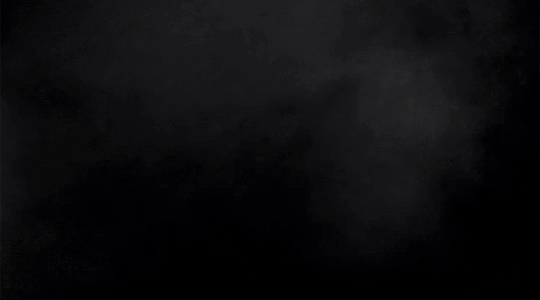


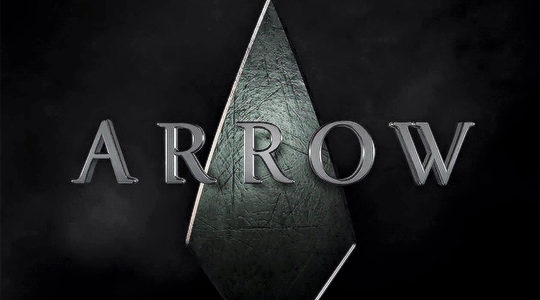
The final three are Felicity, Diggle and Oliver. Their symbols spell OTA. As it should be. Arrow knows how important OTA is. Source arrowsource
Dinah has mastered the withering stare.
"I told Zoe she was made from a cloud." My husband starts taking notes.
Rene saying he's a feminist is oddly hilarious.
Not to be nitpicky but Oliver has lied to William before. He didn’t tell William he was his father or the Green Arrow.
Thanks @callistawolf for her brillant heavyweight analogy
Disclaimer: Any gifs on the blog are not mine. If you would like a gif removed from my reviews, please message me. 6x02 episode gifs credited.
#arrow#oliver queen#john diggle#felicity smoak#olicity#oliver and william#arrow 6x02#arrow reviews#season 6 episode review#arrow spoilers
244 notes
·
View notes
Text
Chapter 4
***I’m SO SORRY that I abandoned this story for so long! Anyway, regular updates on this and PL will be happening since we’re all stuck at home and I’m not working much until August (yay summer). Please read, like, comment, and enjoy!***
-----
It had been two days with no response from Kellin. My anxious self was wondering if he had seen the message. What if something happened to him? What if he blocked me because he didn’t know about the pen pal thing?
Worse, what if he had seen the message, scrolled through my profile, and decided that I was some lame kid who wasn’t worth his time? That thought broke my spirit.
“Will you quit?” Mike asked in an annoyed tone.
“What?”
“You’re all mopey and for no reason. Seriously, it’s bringing me way down.”
“Sorry for having feelings,” I snapped. Mike just rolled his eyes as we continued walking to school.
Maybe my brother was right, maybe I should cheer up. Chances were that Kellin didn’t use Facebook as much as other people so maybe that’s why he didn’t reply. But then again, you get a notification on your phone when someone messages you. Unless he turned off his notifications. But why would he turn them off? Unless…
“Vic!” I jumped at the sound of my brother’s loud voice.
“What?” I asked, irritated.
“Snap out of it, bro. We’re here.” I looked up to see that Mike was right, we were at school already. I sighed and adjusted the weight of my backpack before I walked up the steps.
“You sure you’re okay?” I nodded. “You don’t seem like it.”
I shrugged. “I’m just overthinking. Nothing to worry about,” I assured him.
“If you say so.” I looked to see the worry on his face. I frowned. I didn’t mean to worry my brother with how silent I was being. I gave him a small smile before we parted ways, going to our lockers. After getting the books I’d need for my first couple classes I shut the metal door and slid to the floor. I took my phone out and scrolled aimlessly through Twitter.
All I wanted was to get my mind off of the fact that I wasn’t going to make a new friend. It sucked because we probably would’ve been great friends. I had looked through his profile and I saw that we liked some of the same bands. He had a couple pictures of himself on his page as well.
I wound up on his Facebook profile. I clicked on his profile picture and observed it. Kellin had black hair and didn’t smile much in pictures. I wondered why that was. He did have pretty blue eyes though. I wondered what they looked like in person.
I exited his picture and went down his page some more. There wasn’t much to see since we weren’t friends online, but I got a good idea of who he was.
I was about to put my phone back in my pocket when a notification dropped down the screen.
It was from Messenger.
It was from Kellin.
I was giddy with excitement, but I tried to hide it as best I could since I was in the hallway and other students were already looking at me, wondering why I was sitting on the cold ground.
I opened the app and read the new message:
Hey Vic. Sorry it took a while to answer
That’s it, I thought, no other explanation? I shook it off and typed a response.
It’s ok. Been busy?
He answered almost instantly.
Yeah you could say that
Busy with school rn
I chuckled. Yeah me too. Where do you go to school?
Michigan. You?
San Diego, I answered.
Oh cool. Cali! he responded. I’ve always wanted to go. Is it true that it’s always sunny?
I chuckled. Not always but most of the time. More often than not.
Cool
I scowled at his response. I didn’t want this conversation to die before it even started.
So are you in high school or college or…? I asked.
The three dots lingered on my screen for a while before his response came and took the air out of my lungs.
Elementary. I’m in 3rd grade
What?! WHAT??????!
Lol I’m sorry, I’m fucking with you! I’m in high school.
Sorry, but I couldn’t resist, he sent.
I rubbed my eyes in exhaustion. This kid already had jokes, meaning he was way more outgoing than I could ever hope to be.
I locked my phone before sliding it into my pocket. The school day was about to start, and I didn’t need to have my phone taken by a teacher. I stood and dusted the seat of my pants. I picked up my books and walked to my first class, all while having Kellin’s stupid reply playing in my head.
***
Lunch rolled around eventually, which meant some much-needed guy talk. I wasn’t the most open person, even with my friends, but sometimes I would let some details of my life out to them. I didn’t know what it was but being open and honest didn’t come naturally to me. I could do it with Curtis since we’d known each other all our lives. He knew when I was hiding something, and he’d ease me into telling him what I was keeping secret.
I put my books in my locker then checked my phone. Since it was Friday the gang was going to go off-campus for lunch. We did that about twice a month. We would do it more often, but we always end up fighting about where to go. In my opinion, the argument is never worth it.
I looked at the group chat we had. Tony had suggested street tacos, and since no one else had replied it looked like we were gong to get those for lunch. I smiled because there wasn’t any fighting, meaning the other guys agreed with him, or they hadn’t seen the message. Either way, I wasn’t going to let them argue about this one. I wanted tacos.
I walked to the front entrance of the school to wait for my friends. Soon after I got there, Jaime and Tony walked into my line of sight. I waved them over with a smile.
“So, tacos?” Tony asked when they got to me.
I nodded. “Sounds perfect.”
“I’m down, but only if the other two get their asses down here in the next thirty seconds.” I rolled my eyes at Jaime. It was obvious that he was hungry since he wasn’t normally an angry person.
I texted Curtis telling him to hurry.
We’re coming. Mike has some things to finish…
I rolled my eyes and relayed the message to Jaime and Tony. Jaime huffed. “Tell them where we’re going. Curtis has a car so he can drive Mike to meet us.”
I sent the message and left the building with Jaime and Tony. There was no stopping Hime when he was hungry, so I walked behind him without a word.
After showing out IDs to the security guard in the parking lot, we were on our way to one of our favorite food trucks. My stomach rumbled the closer we got to our destination.
We arrived in about five minutes and had our food in another three. Mike and Curtis joined us after the three of us had settled at a table in the middle of the park.
“Okay, you’ve gotta tell me,” Tony started, “what were you ‘finishing up,’ Mike?”
Mike gulped down his burrito and washed it down with his soda before he answered. “I was working my way into Alysha’s life.”
We all groaned.
“What?” he asked, seemingly offended.
“No offense bro, but you’ve been trying to get with this chick for almost two months. You’ve never talked to her and I doubt she even knows you’re alive. Give it up.”
“Look Hime, you may not agree with me, but that’s cool. You’re still my brother and I won’t take that to heart. Just know that I’ll remember this.”
I breathed a sigh of relief. I knew Jaime said that to get through to my brother, but when Mike was determined there was nothing you could do to stop him. It was better to go along with him than to go against him. I wasn’t sure if what one of his best friends said would hurt him in any way, but I was glad to hear that it didn’t. I don’t think our group would’ve wanted to pick sides in this thing.
“What did you do?” I asked my brother. He smiled his winning smile before he spoke.
“Well I talked to Danielle again. Apparently she thinks Alysha is pretty cool and wants to get to know her better, but Alysha likes to keep to herself. That got me thinking about how I never really saw her talk to anyone in class or in the halls.”
We nodded along, curious to hear where this was going. Believe it or not, but we became invested in Mike’s quest for his girl.
“Well,” he continued, “I figured if she doesn’t wanna talk to anyone, I won’t talk to her.”
We stared at Mike with quizzical looks on our faces.
“Huh?” Curtis asked after some time of silence and pondering from the rest of us.
Mike’s grin grew. “I’m gonna leave her notes in her locker. That way she won’t have to talk to me if she doesn’t want to, and at least she’ll know who I am. At the very least she’ll know someone wants to her to know her.”
“That’s not a bad idea,” Tony affirmed.
I nodded. “I think she’ll like that. And I can help you write some stuff if you want.”
“Thanks you guys. I just hope this works.”
***
After lunch we went about the rest of our day as usual. I had another soccer practice at the end of the day due to the game happening the next day. Once I had packed my gear up from the locker room I met up with Mike and we walked home.
“You don’t think my idea is stupid, do you?”
I looked at my brother. He had a sad, lost puppy dog expression on his face.
“Of course not,” I answered. “You’re showing her that you care about her by trying to make her feel comfortable. I’m sure she’ll appreciate it, and she’ll finally know you exist.”
“Ha ha, so funny,” he said in monotone.
I laughed. Messing with Mike was so easy.
The walk home led to me taking a well-earned shower before heating up leftovers for dinner and lying in bed waiting for sleep. Of course I scrolled through my phone as I waited.
I swiped through the pages of apps on my screen when I noticed I had a notification on the Messenger app.
Shit! Kellin messaged me and I ignored him. He probably thinks I hate him because of his joke. Fuck!
I took a deep breath to calm my nerves before I opened the app and the message.
Hey, I didn’t mean to freak you out earlier. I thought it would be funny. I hope I didn’t scare you off
I smiled at his message. I was worried about what he thought of me and he was worried about the impression he made. It was a bit comforting to know that he was as socially anxious as I was.
It’s cool. I guess it was kinda funny. Sorry, I just had a busy day and I just saw this
No worries dude. It’s all good, he replied. How was your day btw?
Busy. You messaged me at the start of school so I had to put my phone up. Then I had soccer practice
You play soccer? That’s so cool!
I chuckled. You really think so?
Yeah! I’m athletically challenged so I live vicariously through others lol
I couldn’t help but laugh at that. Lol well it’s cool that you think that’s cool
Was that the right thing to say? No, that was stupid. I facepalmed and bit my lip in anticipation for the response to my lame comment. Why’d you say that, Vic? You couldn’t think of something better to say?
I decided to redeem myself. So what kinds of things are you into?
We messaged back and forth for hours. We talked about our interests, hobbies, families, and all of the other usual things people talk about when they first meet. It was almost one in the morning when I finally told him I needed to sleep. Since he was in Michigan that would’ve made it almost 4 AM; I didn’t want to keep him up all night. We said our goodnights and for the first time in a long time, I went to sleep with a smile on my face.
#Pen Pal#Pierce The Veil fanfiction#Pierce The Veil fanfic#Vic Fuentes#Kellin Quinn#Fanfiction#Fanfic#Kellic#Kellic fanfiction#Kellic fanfic
0 notes
Photo
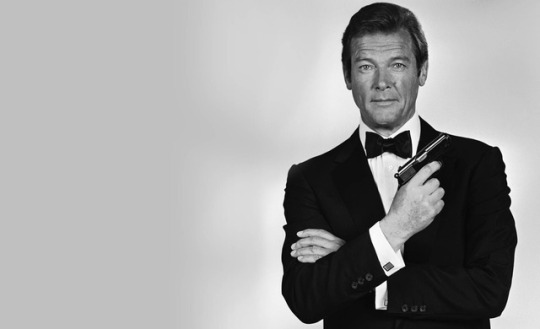
Latest story from https://movietvtechgeeks.com/rip-iconic-james-bond-roger-moore-dies-89-battle-cancer/
RIP: Iconic James Bond Roger Moore dies at 89 after battle with cancer
Best known for his iconic role playing James Bond, Roger Moore has died at the age of 89 after a battle with cancer. The Englishman also was suave as another hero, Simon Templar, in the British TV series 'The Saint.' “I would have loved to have played a real baddie,” he once said. Roger Moore, the handsome Londoner who portrayed James Bond in more films than anyone else and did so with cartoonish, cheeky charm and probably for a bit too long, has died. He was 89 (born on Oct. 14, 1927). Moore, who earlier made his reputation as a suave leading man on the television series Maverick, The Saint and The Persuaders!, died, with a message from his children shared on the actor's official Twitter account reading: "It is with a heavy heart that we must announce our loving father, Sir Roger Moore, has passed away today in Switzerland after a short but brave battle with cancer." It is with a heavy heart that we must announce our loving father, Sir Roger Moore, has passed away today in Switzerland after a short but brave battle with cancer. After George Lazenby was one and done as Bond in On Her Majesty’s Secret Service (1969), Moore took on the guise of Agent 007 in Live and Let Die (1973) and stayed for The Man With the Golden Gun (1974), The Spy Who Loved Me (1977), Moonraker (1979), For Your Eyes Only (1981), Octopussy (1983) and A View to a Kill (1985), which hit theaters when he was nearly 58. He said it was his choice to leave the franchise. His Bond was more of a charmer than a fighter, more of a stirrer than was the shaker embodied by the first Bond, Scotsman Sean Connery. Moore took on the role with a grain of salt, not to mention cigars — as part of his contract, he reportedly was given unlimited Montecristos during production. “My personality is entirely different than previous Bonds. I’m not that cold-blooded killer type. Which is why I play it mostly for laughs,” he once said. Moore’s devilish smile and famously cocked eyebrow made his Bond a more polished, albeit less pugnacious, chap than former bodybuilder Connery’s robust warrior. The late Amy Winehouse apparently was a fan. On her song “You Know I’m No Good” from the 2006 album Back to Black, she sings, “By the time I’m out the door, you tear men down like Roger Moore.” “I probably just rhymed with door,” he once said. “Or she couldn’t find anything to rhyme with Connery.” Moore played Bond more than any other actor — while bedding a total of 19 beauties, by one count — and his films earned more than $1 billion at the box office. But he considered himself to be the fourth-best 007, trailing Connery, Daniel Craig and Lazenby. And after leaving the series, he acted only sporadically. Earlier, Moore starred for six seasons as the slick Simon Templar, who makes a living stealing from crooks, in the popular 1962-69 series The Saint, which aired in the U.K. on ITV and in the U.S. on NBC (an international hit, it sold to more than 80 countries.) In an October 2014 interview, Moore lamented the fact that he pretty much always played the good guy. “I wasn’t an Albert Finney or a Tom Courtenay,” he said. “I didn’t have their natural talent, I had to work quite hard at acting. My life’s been all right, but people like that get to play wonderful parts. I spent my life playing heroes because I looked like one. Practically everything I’ve been offered didn’t require much beyond looking like me. I would have loved to have played a real baddie.” Roger George Moore was born on Oct. 14, 1927, in Stockwell, England south of the River Thames in London. An only child, he was evacuated as a teen during World War II to Worthing, Sussex in southern England while his father remained in London, serving as a police constable who sketched crime scenes. His first job was with Publicity Pictures Production, a film company in London, which specialized in animated cartoons. He worked as a tracer and filler-in, made tea and ran errands. After he was fired, a friend suggested he could make some easy money serving as an extra on Caesar and Cleopatra (1945), then filming outside London. He played a Roman soldier in a crowd scene in the film that starred Claude Raines and Vivien Leigh, and the experience put his life on a new course. He studied at the Royal Academy of Dramatic Art (with future Miss Moneypenny Lois Maxwell), and by the end of the first term, he managed to get into a West End production of The Italian Straw Hat. Moore quickly landed more parts, including a role in another West End Theater production, The Circle of Chalk. In 1945, Moore was drafted and entered officer training school. He was sent to Germany after winning his commission, commanding a small supply depot. During his tour of duty, he joined the Combined Services Entertainment Unit in Hamburg, doing traveling shows throughout Europe. Upon his discharge, Moore landed a role in the musical comedy Trotti True (1949) but then experienced a long period of unemployment. During this time, he joined a repertory company, the Intimate Theatre; performed in such plays as Noel Coward’s Easy Virtue; and supported himself as a model for things like knitwear and toothpaste. After he understudied for David Tomlinson in a West End production of The Little Hut, Moore moved to Hollywood and within days got a role on a 1953 episode of the live NBC anthology series Robert Montgomery Presents. He played a tennis player who is the object of Elizabeth Taylor’s flirtation in the MGM drama The Last Time I Saw Paris (1954), followed by parts in such films as the biopic Interrupted Melody (1955), starring Eleanor Parker and Glenn Ford; The King’s Thief (1955), with Ann Blyth and David Niven; Diane (1956) with Lana Turner; and The Miracle (1959), with Carroll Baker. Moore’s pretty-boy looks and confident manner elicited comparisons to a young Errol Flynn, and he landed his first starring role, portraying the title knight in the U.S.-British swashbuckling TV series Ivanhoe. He played swindler Silky Harris on the 1959-60 ABC series The Alaskans, and when James Garner quit Maverick in a breach-of-contract dispute, Moore stepped in as cousin Beauregarde “Beau” Maverick, even going so far as to wear the costumes that Garner had left behind. He would later quit the show as well. Disillusioned with television in the U.S., Moore starred in The Sins of Rachel Cade (1961) with Angie Dickinson and returned to England to make Romulus and the Sabines (1961), an Italian film about the founding of Rome. His co-star was Italian actress Luisa Mattioli, whom he married in 1969, after his divorce from singer Dorothy Squires was finalized. They had three children together before divorcing in 1996. British media mogul Lew Grade wanted Moore to star as Templar, the character created by author Leslie Charteris and played on the big screen by George Sanders in the 1940s (and by Val Kilmer in a 1997 film). His savoir-faire was perfect for the part, and Moore became an international celebrity. Grade also signed him to star in the big-screen thrillers Crossplot (1969) and The Man Who Haunted Himself (1970) — he considered the latter to be his best film — and then approached him with another TV series, The Persuaders! Moore played English nobleman Lord Brett Sinclair opposite Tony Curtis as rogue New Yorker Danny Wilde, and the mismatched pair solved crimes in exotic locations in the 1971 ITV-ABC series. Around that time, Moore also served as the European managing director of Brut Productions, the show-business wing of Faberge cosmetic works. Working around his 007 assignments, Moore appeared in Shout at the Devil (1976) with Lee Marvin, The Wild Geese (1978) with Richard Burton, The Sea Wolves (1980) with Gregory Peck and Niven and The Cannonball Run (1981) with Burt Reynolds. He also starred in the 1976 NBC movie Sherlock Holmes in New York (Patrick Macnee played Dr. Watson and John Huston was Professor Moriarty). In 1999, Moore was awarded the Commander of the Most Excellent Order of the British Empire by Queen Elizabeth II, and knighthood followed in 2003. He spent the past several years doing charity work as a UNICEF Goodwill Ambassador. Survivors include his wife Kristina, whom he married in 2002, and children Deborah, Geoffrey and Christian. After to describe his version of Bond in relation to others, Moore told NPR in November 2014: “I look like a comedic lover, and Sean [Connery] in particular, and Daniel Craig now, they are killers. They look like killers. I wouldn’t like to meet Daniel Craig on a dark night if I’d said anything bad about him. ���George [Lazenby], Timothy [Dalton] and Pierce [Brosnan], we’ve been together, the four of us. But Sean, Sean really was sort of not that enamored of being confused with James Bond all the time. Sean … damn good actor, but he felt that he was only being remembered for Bond. I personally don’t give a damn. I just want to be remembered as somebody who paid his debts.
Movie TV Tech Geeks News
3 notes
·
View notes
Text
Round 11
THE SEA EAGLE
MAKING RUGBY LEAGUE GREAT AGAIN!!!

19 May 2018
Manly Sea Eagles 24
Def.
FWRCL Storm 4
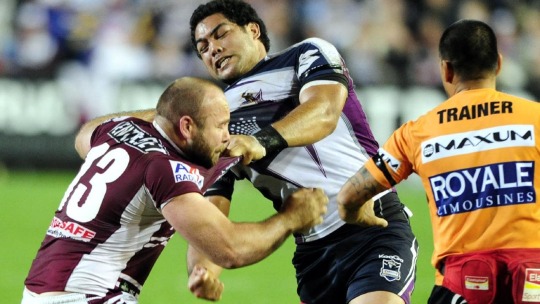
Regrettably the Sea Eagle was unable to watch this game live due to the insistence of Mrs. Eagle that he watch a procession of rugby loving inbreds, ex beautiful game players and people condemned to hell by Izzy Falou at the wedding of Ed Sheerin to Serena Williams and also Price Harry to Meghan. Both Ch 7 and Ch 9 made a good fist of the coverage of the wedding, with the Sea Eagle’s only complaint being that both coverages were not extensive enough, restrained, to the point and far too short. What was disappointing was the clash not only with the Manly game, but also to the Bond movie OHMSS starring Aussie George Lazenby and former (and very spunky) Avenger Diana Rigg and Telly Savalas (not so spunky). What a night of viewing it was.
Thankfully however, the game (and the Bond movie) was taped allowing the Sea Eagle to catch up on this fixture (and Bond’s work with the girls) sometime shortly thereafter.
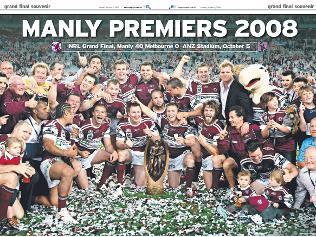
Truly, there is no greater feeling than to beat the FWRCL (Filthy Wrestling Rorting Cheating Lifting) Storm particularly on their home turf. Some say history never repeats, but it is worth recalling the last time Manly fronted up against a FWRCL Storm team without a suspended Cameron Smith resulted in one of Manly’s finest moments – that being the 40-nill thrashing in the 2008 premiership decider.
The first half was a pretty dour affair, plenty of stoppages, errors and of course the obligatory and mandatory penalties as the refs continue to blow the pea out of the whistle. This was reflected in the 2-2 score at the break.

The second half however was a different affair altogether, especially from Manly. While errors continued to flow these were in the main made by FWRCL Storm and Manly took the ascendancy. The game erupted 10 minutes into the second half with scenes not dissimilar to those seen at the now infamous Brawl of Brookvale in 2011. FWRCL Storm centre Curtis Scott was sent off (the first player since 2015) for punching Dylan Walker. Walker was binned for being punched in the head and was also joined in the bin by Nimby Koriasu who appeared to throw a punch.
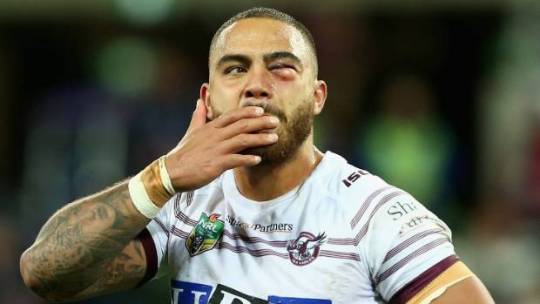
This incident seemed to fire Manly up and they ran away with a well-deserved and much needed 24-4 victory.
Whilst Manly will be happy to take the win and take a further step away from the spoon, without Cameron Smith FWRCL Storm are a rudderless ship and when he finally hangs up his boots they will be history. And thankfully so as FWRCL Storm are a blight on the game and represent all that bad in rugby league.
It is fair to say Manly and the FWRCL Storm hate each other.
RETURN TO THE NEST

A lot has previously been written noting the fall from grace of former Manly players when they leave the nest. In this regard let us quickly consider the following examples
Bob Fulton – and immortal of the game and Manly legend. Premiership winner at Manly went to the Roosters and achieved little but returned to the nest to become premiership winning coach.
Paul Vautin – premiership winning captain and Manly life-member went to the Roosters and ended up on the bench in reserve grade.
Ronnie Gibbs – premiership winner, left Manly at his peak went to the Goldie and was never heard from again.
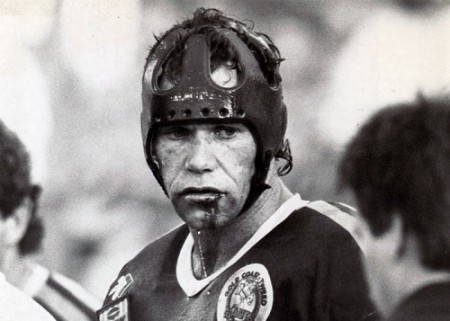
Anthony Watmough – Manly local junior born and raised in the Narrabeen. Multiple premierships at Manly, SOO, Kangaroo etc, went to Eels and lasted one year into a 3-year deal spending most of it in the stands injured.
Keirin Foran – a poster boy for leaving the nest. Premiership winner at Manly, went to the Eels and ended up with a brothel owner as his only friend, allegedly living in his car and front and centre with the NRL integrity dept. Has followed this up with unsuccessful stints at the Warriors and Dogs.
Will Hopoate (and father John) – premiership winner in his first year in the top grade, as well as graduating to SOO, Went to Eels [don’t they all], stunk up the joint and is now struggling at the Dogs. And let’s not forget father John, also a premiership winner at Manly, went to the Tigers and is now only remembered for shoving his finger where the sun don’t shine
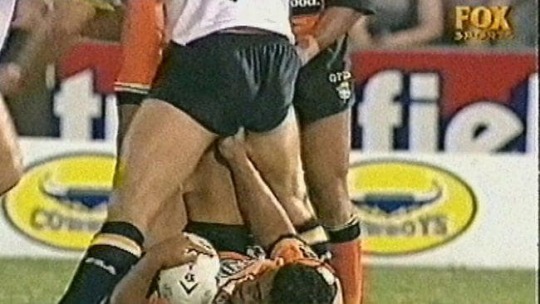
Tony Williams – a lazy and useless winger when he arrived at Manly but a coaching master stroke by Des Hasler saw him transform into a less lazy and less useless impact bench forward, culminating with a premiership win where in the decider he was smart enough to stay out of the way when the whips were cracking
Des Hasler – premiership winner as both a player and coach at Manly. Went to the Dogs stunk up the joint, f#$ucke$d up their salary cap and was sacked leaving the club in turmoil.
There are more examples but space limits it.
As detailed above, in virtually all instances when a player/coach leaves the nest they regress …. in most cases alarmingly. Last week the Sea Eagle identified Jarrod Warea Hargreaves as possible the only player in living memory to buck this trend, but unlike those detailed above Warea Hargreaves was an up and coming, non-premiership winner when he left Manly squeezed out by salary cap pressure. But even he is now struggling at the Roosters to get a starting spot.
The return of Trent Hodkinson to Manly in this fixture and hopefully more, now begs the question - Do they get any better when they return to the nest? Hodkinson a former Manly player, was a solid performer who never achieved any great heights during initial stint in 2010, when he transferred to the Dogs and went okay but followed this up with a shocker at the wooden-spoon winning Knights where he spent much of his time on the bench or at the feeder club.

Coming off the bench Hodkinson was solid in his return to Manly and hopefully will fill a role similar to that done by Blake Green in recent years. That said only time will tell if they do indeed go better when they return to the nest. One thing is for sure, he can kick goals, and he was the half when NSW last won an Origin series, so there is something to work with. A start would be using him to take the 2 every time Manly get a penalty at least 30 metres out and anywhere 10m in form the sidelines.
APPOLOGY TO NZ SUPER RUGBY TEAMS
Last week the Sea Eagle noted that Australian Super Rugby teams had lost 30 consecutive games to their NZ opponents. At the time the Sea Eagle privately had reservations as to the accuracy of this stat, given that this was likely to be an exaggeration. Sadly, on further review the Sea Eagle has discovered that the figure is nowhere near 30 and is in fact now closer to 40 consecutive losses. The Sea Eagle prides himself on accurate and factual reporting and is embarrassed by this misrepresentation, so much so that after considering whether or not there was a Peter Beattie type moment, he issues to the following apology to NZ super rugby and its supporters.
“You can have a blame game from now until eternity but the reality is, the buck stops with me. I’m not interested in blaming anyone but me,” The Sea Eagle said.
Did I stuff up, yes? Could I have done better, yes. It’s my fault and I take this opportunity to apologise to NZ rugby, its supporters and all those affected by this gross inaccuracy”
Footnote – led by noted gay-hater Izzy Falou, the NSW Waratahs have apparently ended this streak of consecutive losses beating some NZ mob during the course of the weekend.
THE ROYAL WEDDING
The less said about this debacle the better. Still, the Australian government gift of Two Akubra hats to the wedding couple was something to behold. Not that there is anything wrong with Akubra Hats. They are fine headwear, tough and true blue. But really, they are more suitable as a gift to an visiting Asian dignitary than a Prince and his Hollywood actress wife.
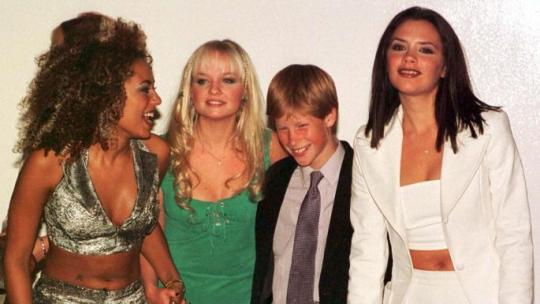
For a nation in debt to the tune of around ½ a trillion dollars, this is the sort of spending restraint that needs to be replicated in all areas. Still, the Sea Eagle can’t help but wonder where this is just sour grapes from a bunch of useless latte sipping republicans who don’t have the capacity to put forward a simple and self-evident proposition such as that, and convince the Australian public to vote for it.
As for Meghan Markle’s dad, and her half-sister, the Sea Eagle can reveal the Director of Controversy was up to this one to his eyeballs. The Royals dd not see it coming, and his efforts in getting her dad and half-sister to sell their story to the Paparazzi for a few slimy pieces of silver, was truly something to behold. The great man, is, as Tina Turner sang, Simply the Best.
BITER, STRETCHER OR NIBBLER?
During the week Allens confectionary released this promotion on Facebook, are you a biter, stretcher or nibbler.

Allen's Lollies
The nation is divided! Are you a stretcher or a biter? A splitter or a nibbler? Join the debate - tell us how you eat your Allen’s?
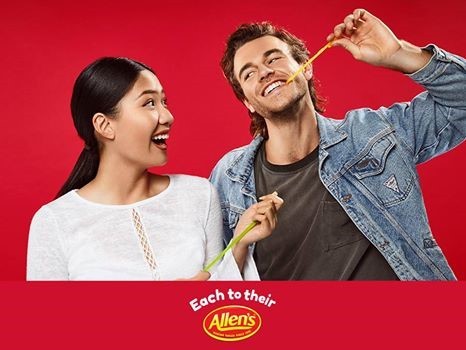
Yet again, Rugby League central have missed this opportunity. Let’s face it, no sporting code is as steeped in the tradition of biting, stretching and nibbling than Rugby League.
As for biters, over the years many a player has had a good old chomp. Going back to the glory days of Bumper Farrell, and most recently James Graham biting into Billy Slater’s ear in the 2012 GF.
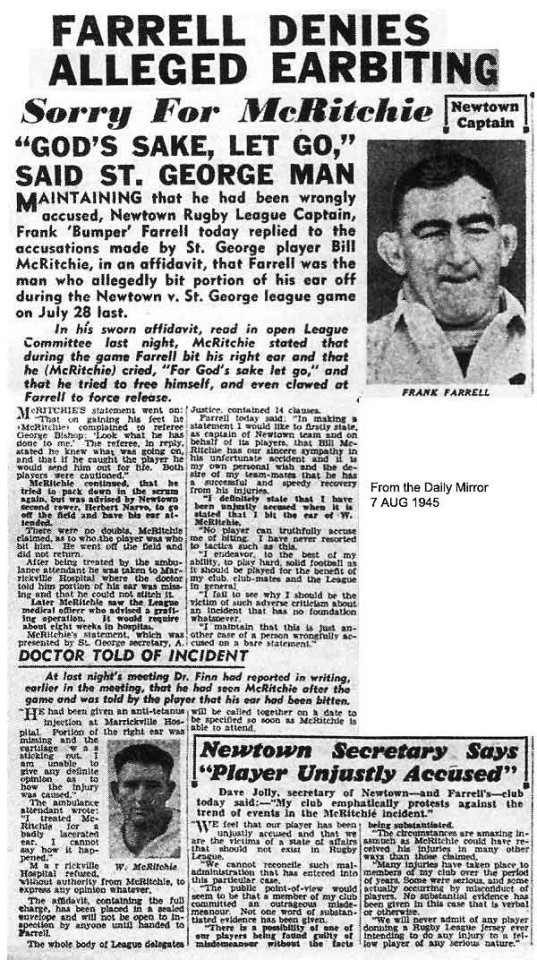
As for stretching, the Melbourne Storm are experts are pulling a players legs in the areas they are not supposed to go, with Captain Camron Smith suspended this week for a so called wishbone tackle on a Gold Coast opponent.
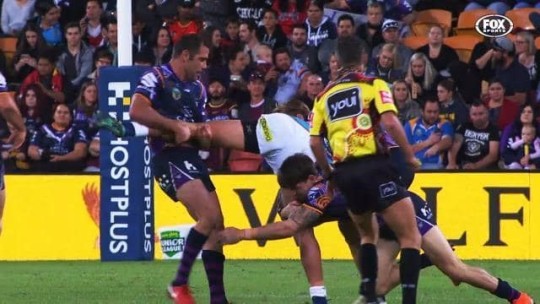
Why isn’t the NRL teaming up with Allens on this one? As Tooves says, they’re has to be an investigation.
YOU’RE FIRED

FORGET the punches, the NRL suffered an embarrassing black eye even without the biff over a horrible oversight that saw both Dylan Walker and teammate Api Koroisau, who were sin-binned for their role in a second-half brawl, return before 10 minutes had lapsed. It has been reported that the Manly players had returned to the field one minute and 41 seconds early.
This is yet another embarrassment for the under-fire Peter Beattie led NRL with Beattie issuing the following statement.
“You can have a blame game from now until eternity but the reality is, the buck stops with the NRL. I’m not interested in blaming anyone but me,” Beattie said.
Did we stuff up, yes? Could we have done better, yes. It’s our fault and we take this opportunity to apologise to all those affected by this stuff up”
The Sea Eagle says – someone has to go !!
THE SEA EAGLE

0 notes
Text
New Post has been published on WilliamBruceWest.com
New Post has been published on http://www.williambrucewest.com/2017/05/26/west-week-ever-pop-culture-review-52617/
West Week Ever: Pop Culture In Review - 5/26/17
Here we are, on the verge of a 3-day weekend, which means nobody’s gonna read this thing. Still, “the show must go on”…
Well, the week was filled with spider news, as last Friday Sony announced that Tom Hardy will star in a Venom film. If you’re not “in the know”, Venom is a Spider-Man villain comprised of an alien symbiote suit and Peter Parker’s professional rival, Eddie Brock. Sadly, the film’s not meant to cross over with Spider-Man: Homecoming or any bit of Tom Holland’s portrayal. I’m starting to think Sony’s deal with Marvel Studios is actually a bad thing, as it seems like Spidey’s addition to the MCU is to the detriment of his expanded universe to which Sony still owns the rights. I don’t really care about a Venom without a Spider-Man. To add to that, yesterday, Sony announced a film starring Spider-Man supporting cast members Silver Sable and Black Cat, to be directed by Gina Prince-Bythewood (Love & Basketball). I really don’t think there’s much to say about these characters without the possibility of a Spider-Man cameo. I get where Sony’s coming from; they have all these characters, so they might as well do something with them. That said, earlier talks made it sound like they were building their own Spider-Man-centric film universe, but since the MCU deal went through, Spider-Man no longer seems to be part of the equation.
Meanwhile, the Licensing Expo was this week, and we got our first look at the poster for the animated Spider-Man movie, starring Miles Morales. Apparently it was created by a child. Maybe a Make-A-Wish kid? Seriously, that thing is terrible.
youtube
It wasn’t all bad Spider News, however, as we got the third trailer for Spider-Man: Homecoming. They’re basically giving away the movie at this point, but I’m still a guaranteed butt in a seat. A lot of people are having issues with it, but I kinda like that this is basically Iron Man 4. I really didn’t need a new Spider-Man, so throwing Tony Stark in there is a good way to get me interested. I mean, I liked Tobey Maguire. I liked Andrew Garfield. I’m sure I’ll like Holland, but I’m kinda tired of the Spider-Man revolving door. Now that he’s tied into the MCU, I hope the Holland casting sticks. Then again, we’ve had three Hulks already, so…
This poster, however, is horrendous, but endearingly so. I mean, it’s really bad Photoshop, but I still kinda like it. It’s busier than Times Square at rush hour, but I love it in all its ugliness. It looks like it should be airbrushed on a denim jacket at the mall.
Across the aisle, things aren’t going so well for the DC movie slate, either. First up, Doug Liman has dropped out of directing the Justice League Dark film due to his commitment to Lionsgate’s adaptation of the young adult series Chaos Walking. In case you didn’t know, Justice League Dark would focus on the more mystical DC Comics characters, like John Constantine, Zatanna, Deadman and others, battling supernatural threats – ya know, like the kind the Suicide Squad had no business fighting. I’ve got no interest in this, but that’s ’cause I don’t really like magic. If they manage to get Swamp Thing into the movie, though, I think it’ll increase its appeal. Right now, though, they’re just a bunch of magical nobodies coasting on the Justice League name which might not even hold any power if that movie fails this Fall.
In sadder news, Zack Snyder bowed out of Justice League post-production work to spend time with his family as they grieve the loss of his daughter, Autumn, to suicide. It was revealed that Joss Whedon was brought in to finish the film, which now has fans cautiously optimistic. Just last week, there were reports that there had been so many reshoots that the film was basically a different movie from what was originally shot. It’s possible, however, that these reshoots were part of Whedon’s plan. It’s really unfortunate what the Snyder family is going through, and it’s deplorable that some folks are making jokes about the situation.
In other movie news, it was revealed that Tom Cruise’s upcoming film, The Mummy, will kick off a Universal Monsters cinematic universe called Dark Universe. I bet they stayed up real late to think of that one! Anyway, Russell Crowe will portray Dr. Jekyll (who also appears in The Mummy), Javier Bardem will play Frankenstein’s monster, and Johnny Depp will play The Invisible Man. The next film in the franchise will be The Bride of Frankenstein, to be released on Valentine’s Day of 2019. Ya know what’s funny? DC’s Justice League Dark film was also going to be called Dark Universe. Somebody’s gonna have to lawyer up!
In TV news, it was reported that Hamilton scribe and star, Lin-Manuel Miranda, will voice Fenton Crackshell-Cabrera AKA Gizmoduck in the upcoming DuckTales reboot. Cabrera? Really? He’s even brown now to go along with the name change. I know some folks are gonna have an issue with this. Hell, I even kinda have an issue with it. But if they’re gonna inject some diversity into Duckburg, I guess I’d rather them do this than, say, Launchpad McQuack-Jenkins.
While we knew that Bobby Moynihan was leaving Saturday Night Live, just hours before the season finale it was revealed that Vanessa Bayer would also be leaving. Then, Monday morning, it was reported that Sasheer Zamata would also be leaving the show. I’m really gonna miss Vanessa, as she definitely grew on me. Her characters have this adorable aloofness to them that I’ve come to enjoy. She’s got a big future playing the best friend in romantic comedies ahead of her. Sasheer was simply underutilized. She was always in the background of sketches, or only had a line or two. I hear that she really shined in the writers room, coming up with sketches like Black Jeopardy. I feel like SNL will merely be a footnote on her resume, as she goes on to bigger things, like Noël Wells and Jenny Slate.
Last week, I had the pleasure of joining some of my favorite people on the Nerd Lunch podcast, where discussed some of the greatest pop culture deaths. Nobody was safe, from Santa Claus to Michael Knight! And I finally got to join my pal Vincent (@RobotsPJs) on a podcast, which has been years in the making. We had a great time, and I think you’ll have a great time listening to it, so check it out!
Song of the Week
youtube
This week, I’ve got “It Ain’t My Fault”, by Brothers Osborne. Not only are they local boys, but I love the fact that this song/video has layers. Read the title and then watch the video. They’re trying to tell us something – the same kind of thing that sank the Dixie Chicks all those years ago. My how times have changed!
Things You Might Have Missed This Week
Fresh off playing nurse Claire Temple in the Marvel Netflix shows, Rosario Dawson is in talks to play Dr. Cecilia Reyes in the X-Men spinoff film New Mutants. Just go to medical school already, Rosario!
Twin Peaks made its triumphant return for those of you who are fans. Based on the ratings, that’s not many of you…
The Get Down was canceled by Netflix after one season.
Chicago Justice was canceled by NBC after one season.
The Ben 10 reboot was renewed for a second season at Cartoon Network.
SpongeBob SquarePants was renewed for season 12 at Nickelodeon, taking it through its 20th anniversary.
Trial & Error was renewed for a second season at NBC.
The Black-ish spinoff, College-ish, received a 13-episode order on Freeform.
TruTV’s Impractical Jokers will enter national weekday strip syndication this Fall.
The bodies haven’t even gone cold and they’re already announcing a reboot of the Resident Evil franchise, this time produced by James Wan (Saw).
Tom Holland has been cast as young Nathan Drake in the film adaptation of the Uncharted video game.
In the realm of musical sequels that no one asked for, Mamma Mia: Here We Go Again! will be released July 20th, 2018.
Elizabeth Banks is producing a Charlie’s Angels reboot, scheduled to be released June 7th, 2019.
Tom Cruise announced that a Top Gun sequel is planned to begin filming next year. Fat Val Kilmer is waiting by the phone.
TJ Miller is leaving HBO’s Silicon Valley at the end of the season.
Surprising no one who’s been paying attention, Power Rangers continues the trend of just adding “Super” to the title of its latest incarnation’s second season with Power Rangers Super Ninja Steel
The Boss Baby 2 is a-coming, March 26th, 2021.
Sophia Bush is leaving Chicago P.D. after last night’s season finale
youtube
In the UK, there’s an annual event called Red Nose Day, where they’ve been raising money to end child poverty for nearly 30 years. Launched by the nonprofit Comic Relief, the event has since raised over $1 billion globally. The event came to the US in 2015, where you can buy a red nose at Walgreens for a dollar, with the proceeds going to the charity. One of the co-founders of Comic Relief happens to be Richard Curtis – writer and director of one of my favorite movies, Love Actually. Now, a lot of people hate the film because it gave way to Garry Marshall imitations like Valentine’s Day and New Years Eve. You know, those schlocky romantic comedies with an ensemble cast where all the storylines converge at some point. I don’t care, ’cause I happened to like those movies, too, but I especially like Love Actually.
Well, to celebrate this year’s Red Nose Day, Curtis reunited most of the cast of Love Actually to give us a 15-minute sequel to the film, called Red Nose Day Actually. We get to catch up on the characters 13 years later, and I have to say that I was smiling the entire time. It was great seeing those characters again, from Bill Nighy’s Billy Mack to Hugh Grant’s Prime Minister. I could’ve done without Rowan Atkinson’s meticulous shopkeeper, but it was even sorta nice seeing him again, too. You feel old as shit, though, when you see little Sam, who’s now 26 years old. I think his segment made me the happiest of all. Or maybe it was seeing Jamie and Aurelia and their kids. Or maybe it was seeing Martine McCutcheon again (why doesn’t she get more work stateside?!). I don’t know. I loved the whole damn thing.
The special originally aired in the UK in March for their Red Nose Day, but they’ve gone to great pains to keep it off the internet. Yesterday was the US’s Red Nose Day, and a new version of the short aired last night on NBC. Ya know, they should really have everyone celebrate on the same day worldwide, but what do I know? Anyway, I actually missed the NBC version because of things, but I was intrepid enough to find the UK version online. This morning, however, NBC posted it on their website so I was able to compare and contrast. The only real difference is that the UK version cut out the Laura Linney update, with Patrick Dempsey as her husband. It was a nice aside, but I guess British audiences don’t know who Dempsey is, so they didn’t miss out on much. Anyway, I wish more movies would give us short reunion updates, maybe on anniversary edition Blu Rays or something. It was nice to get just a taste of what everyone’s been up to, without them being burdened by a full film that would be more than likely fall short of the original. If you’ll excuse me, I’m gonna go watch this thing a few more times, but it’s safe to say that Red Nose Day Actually had the West Week Ever.
#Country#DC#Knight Rider#Marvel#Movies#Power Rangers#Race#Syndication#Television#Video Games#West Week Ever#X-Men
0 notes
Text
Expert: In bygone years, defenders of the Guardian’s supposed ‘progressive’ credentials would typically cite the presence of Seumas Milne, Owen Jones and George Monbiot. The newspaper’s cupboard is looking decidedly threadbare now. After a year’s leave of absence, Milne left the paper permanently in January to continue leading Jeremy Corbyn’s media team. Jones has been notable for his, at best, conflicted support of Corbyn having, for two years, turned a blind eye to his paper’s relentless opposition to Corbyn’s leadership. Jones has also allowed himself to be used by the Israel lobby. Meanwhile Monbiot, notwithstanding years of valuable environmental journalism, has shown consistently poor judgment when writing about foreign policy. There are now no plausible fig leaves to hide the Guardian’s liberal gatekeeper role in suppressing, marginalising and smearing the required radical challenges to established power. This insidious role was highlighted once again in a woeful piece by Jonathan Freedland in the wake of last week’s council elections. Titled, ‘No more excuses: Jeremy Corbyn is to blame for this meltdown’, the Guardian sage and BBC contributor pointed to a projected national figure of 27% support for Labour, ‘the worst recorded by an opposition since the BBC started making such calculations in 1981.’ This time it was not ‘a judgment delivered by the hated mainstream media’: the pejorative phrase suggesting that the ‘hate’ is unjustified or overwrought. ‘The verdict of the electorate’, the former Guardian opinion editor intoned, ‘was damning’. We will examine the thinking behind Freedland’s sweeping dismissal in what follows. But first, we need to remind ourselves of the incessant media vitriol and opposition faced by Jeremy Corbyn since he first ran for the Labour leadership in 2015. Extensive evidence of this corporate media bias has been presented in studies published by Media Reform Coalition and Birkbeck, University of London and by the London School of Economics. Why should there be such huge media – indeed establishment – opposition towards Corbyn? Des Freedman, Professor of Media and Communications at Goldsmiths, University of London, puts it succinctly: Jeremy Corbyn represents – and, crucially, is seen to represent – a potential threat to vested interests in a way that right-wing Labour figures never did. This is what underlies the extraordinary hostility to his leadership. Any radical individual or movement that refuses to abide by the usual consensus on austerity, immigration or foreign policy can expect to be either marginalised or ridiculed, misrepresented or ignored. This tells us a lot about the balance of power in the mainstream media: you depart from the rules, you should expect to be punished. A letter from numerous academics and media activists, including Greg Philo of the Glasgow Media Group, Noam Chomsky and Edward Herman, published in the Guardian, ironically, noted: The leadership of Jeremy Corbyn has been subject to the most savage campaign of falsehood and misrepresentation in some of our most popular media outlets. He has, at different times, been derided, ignored, vilified and condemned. Let’s now turn to Jonathan Freedland’s article. A key piece of his ‘evidence’ for pinning Labour’s ‘meltdown’ on Corbyn comes from Dave Wilcox, a former Labour group leader in Derbyshire, who said that he was repeatedly told by ‘genuine Labour supporters’ when canvassing that ‘we are not voting for you while you have Jeremy Corbyn as leader.’ Freedland adds: He will be howled down, of course, by the online Corbynista army who will tell Wilcox that what he heard with his own ears never happened, that it’s an invention of the media, that it’s really the fault of the media and plotting Labour MPs. The sneering reference to an ‘online Corbynista army’ reveals the smug condescension at the core of Freedland’s mindset. From his superior perspective, there is simply no need to take seriously the ample evidence of intense media and political antagonism towards Corbyn and his policies; likewise, the barrage of opposition from many Labour MPs whose views often lie to the right of their own constituents and local party members. As Graham Bash of Labour Briefing observes, when Corbyn won the Labour leadership in September 2015: the parliamentary Labour party shamefully refused to accept the party’s overwhelming verdict, briefed against Corbyn, forced a second leadership contest, acted as a party within a party and feared a Corbyn government more than another Tory government. Rather than point to any of this, Freedland instead wants to emphasise the views of two focus groups in Birmingham, largely consisting of Labour voters. This was an event co-organised by Huffington Post and Edelman Communications, a huge PR company (clearly with no vested interest in shaking up society): They described Jeremy Corbyn as a “dope”, “living in the past”, “a joke”, as “looking as if he knows less about it than I do”. One woman admired Corbyn’s sincerity; one man thought his intentions were good. But she reckoned he lacked “the qualities to be our leader”; and he believed Corbyn was simply too “soft”. Freedland belittled Labour’s John McDonnell for supposedly turning a blind eye to the facts of the election: When the best that shadow chancellor John McDonnell can offer is that the party has not been completely wiped out, you glimpse the scale of the disaster. But Corbyn and his team do not dispute the mammoth task that lies ahead if success at the General Election on June 8 is to be achieved. And, unlike Freedland, McDonnell has rightly pointed to the role of the media in blocking fair and open debate which is, we are so often told, a prerequisite for genuine democracy: We expect all the usual abuse and bias from the Mail and Sun, but the Guardian and BBC are just as biased, but in a more subtle way. In a piece titled, ‘The media are trying to destroy Jeremy Corbyn,’ McDonnell expanded about the press coverage he and Corbyn had received during the Labour leadership campaign: None of them, except the Morning Star, supported us. Even the liberal left Guardian opposed us and undermined us at every opportunity. (Our emphasis) He added: It can sound like we’re paranoid but the reality is that the treatment Jeremy has had across the media has been appalling. It’s the worst any politician has been treated. The problem with the BBC and other broadcasters is that because of the cut backs that have gone on with journalists, they are taking their stories from newspapers rather than investigating and reporting for themselves and therefore the bias of the press infects the broadcast media too… It’s an object lesson about the establishment using its power in the media to try and destroy an individual and what he stands for. As we saw above, there is ample evidence of this vitriolic media opposition towards Corbyn and what he stands for. But Freedland, a well-rewarded journalist with a typically complacent liberal Guardian/BBC worldview, has no interest or incentive in seriously exploring this ‘savage campaign’. The disdain, indeed contempt, for socialism in Guardian/BBC circles has been made ever more apparent by the direct threat posed by a Corbyn-led Labour party. No wonder, then, that historian Mark Curtis, author of important books on UK foreign policy including ‘Web of Deceit’ and ‘Unpeople’, described Freedland’s article as ‘a visceral hate-piece’. There were so many possibilities for the most ridiculous or laughable lines from Freedland. Curtis proposed this one: Having finally won control of the Labour party after three decades of Stakhanovite effort, what radical programme have these great revolutionaries pledged to the nation? Four extra bank holidays. One of our readers, Rob Newton, begged to differ with Curtis, nominating these lines instead: Corbyn’s defenders will blame the media, but what was striking about these groups was that few of the participants ever bought a paper and they seldom watched a TV bulletin. As Newton pointed out, Freedland was apparently proposing a remarkable phenomenon of ‘opinions informed by osmosis’. Or is it a complete coincidence that people might believe Corbyn is supposedly ‘unfit’ to be Prime Minister after nearly two years of the ‘mainstream’ media constantly hyping this ‘truth’? But what about these lines? Blaming others won’t do. Instead, how refreshing it would be, just this once, if Corbyn and McDonnell put their hands up and took even a small measure of responsibility for this calamitous result. This is also surely a strong candidate for most risible comment. There is the added irony that Freedland has completely buried the role of his own newspaper in opposing Corbyn from the very moment he ran for the Labour leadership. To not even mention this fact, is to betray the intellectual dishonesty at the heart of Freedland’s ‘analysis’. He even makes a ludicrous claim for Tony Blair’s ‘leftwing’ credentials: Corbyn and McDonnell’s programme includes nothing remotely as leftwing as, say, the £5bn windfall tax on the utilities promised, and implemented, 20 years ago by the supposed evil neoliberal Tony Blair. It appears that Freedland is just not ready to let go of one of his lifetime heroes. Then again, it seems that hardly a week goes by without the Guardian wheeling out the blood-soaked war criminal to promote the former PM’s views; not least if it means another chance to try to land a punch on Corbyn. Ironically, just a few days after Freedland’s egregious article was published, his erstwhile colleague Roy Greenslade, the Guardian’s former media commentator, now Professor of Journalism at City University London, had a generally good piece titled, ‘Prince and commoner: one rule for Philip and another for Jeremy’. Greenslade rightly noted that: Mainstream media as a whole took its gloves off and Corbyn’s electoral hopes have been doomed from day one. He was “a great leap backwards”, said the Mail. Beware this “absurd Marxist”, said the Express, while the Daily Telegraph referred to his “divisive ideology” and “atavistic hostility to wealth and success”. And the Sun? It just called him “bonkers”. There was scepticism too from the liberal left. The Independent thought he would not persuade middle England to accept his policies. Neither the Daily Mirror nor the Guardian greeted him with open arms. Greenslade continued: The overall anti-Corbyn agenda, repeated week upon week, month after month, was one that broadcasters were unable to overlook, despite their belief in balance and adherence to impartiality. News bulletin reports reflected the headlines. Current affairs programmes picked up on the themes. That’s how media narratives are constructed. Aside from a general antagonism towards his brand of socialist politics and the gleeful exploration of internal party dissension, overlapping themes of inconsistency, incompetence and incoherence have emerged. He concluded: In such a climate, was anyone in the least bit surprised by Labour being stuffed in the local elections? This was a rare example of honest commentary in stark contrast to the Guardian’s shameful campaign against Corbyn (which has appalled many of their readers). Inevitably, Greenslade did not go anywhere near far enough in acknowledging his old paper’s endless attacks on Corbyn. To say merely that the Guardian did not greet Corbyn with ‘open arms’ was conspicuously mealy-mouthed in an otherwise admirable piece. But, to his credit, at least Greenslade recognises a real media phenomenon that his ex-colleague Freedland seems desperate to bury. http://clubof.info/
0 notes
Text
WE NEED MORE PERSUADERS FANS!!
One of my aunts and I are, again, doing a 'The Persuaders!' marathon and I ask you...
How come this hasn't turn into a big thing in Tumblr?
Look... I'm not usually a fan of shipping male leads but this show just lends itself to it... and (at least in the Spanish Dub) Tony Curtis' character makes jokes about it and for what I just saw on a Youtube short, he'd made jokes like that on set too!
C'mon tumblerinas do your magic!
In case that you need to know what this is about:
Lord Brett Sinclair (Roger Moore) and Danny Wilde (Tony Curtis) are two playboys that are recruited by a retired Judge to help him solve cases that he couldn't solve in the past.
It is never really explained why these two would be "dynamite!" as Judge Fulton says but Wilde has street smarts (kind of a juvenile criminal turned into oil-millonaire), Sinclair has... I guess, contacts and knowledge gained through his title, both of them served their countries and in a more confusing vein sometimes they have money and sometimes they don't (reason why the Judge can pressure them into doing his bidding).
Yes, in pretty much all of the episodes the main reason why they get involved is a girl (two if they are lucky) but sometimes they do end empty handed.
After a rocky start they develop a wonderful friendship based on picking on each other but with true love and care for each other's wellbeing. (And Danny calls Brett "my prince" A LOT).
I think that the most Tumbler-catnip episode for shipping is one called Angie...Angie where a Danny's old friend crosses paths with both and ends up being a person of interest. Brett is certain that Angie is guilty but Danny refuses to think so.
Is from 1971, only one season BUT SO WORTH IT. You can watch it here
#tumblerina#do your job#new otp#tumblr fandom#gay#lgbtq#come on I can't be the only one seeing it#well... apparently Tony Curtis saw it too#yes he is Jaime Lee's dad#roger moore#tony curtis#the persuaders#rb
29 notes
·
View notes